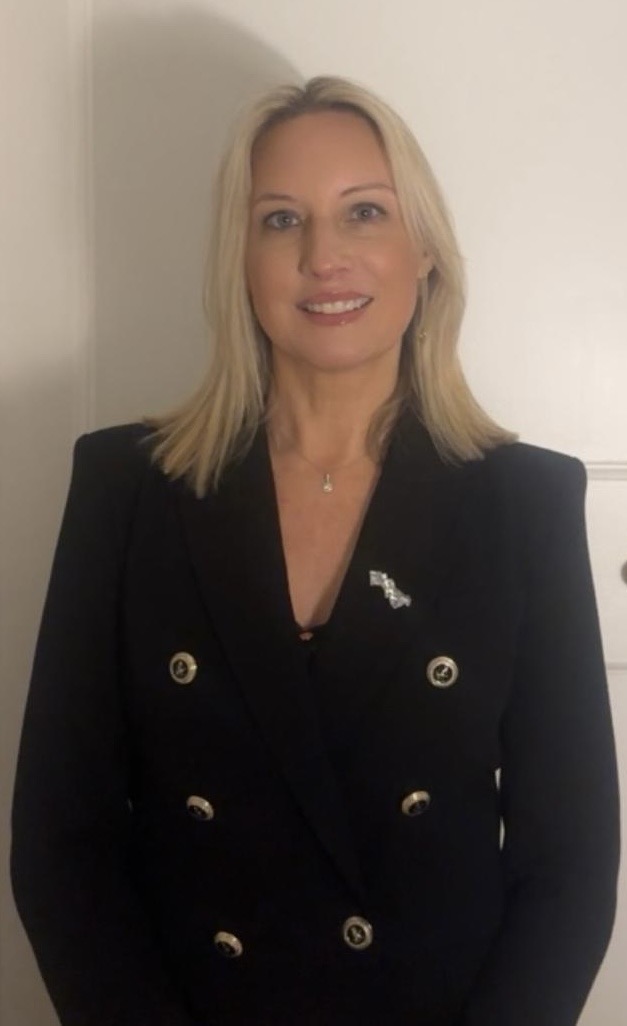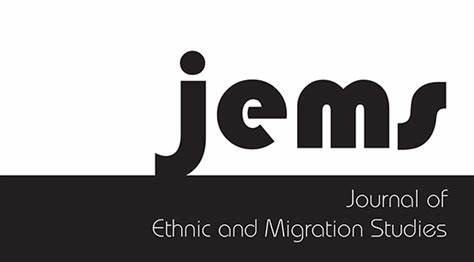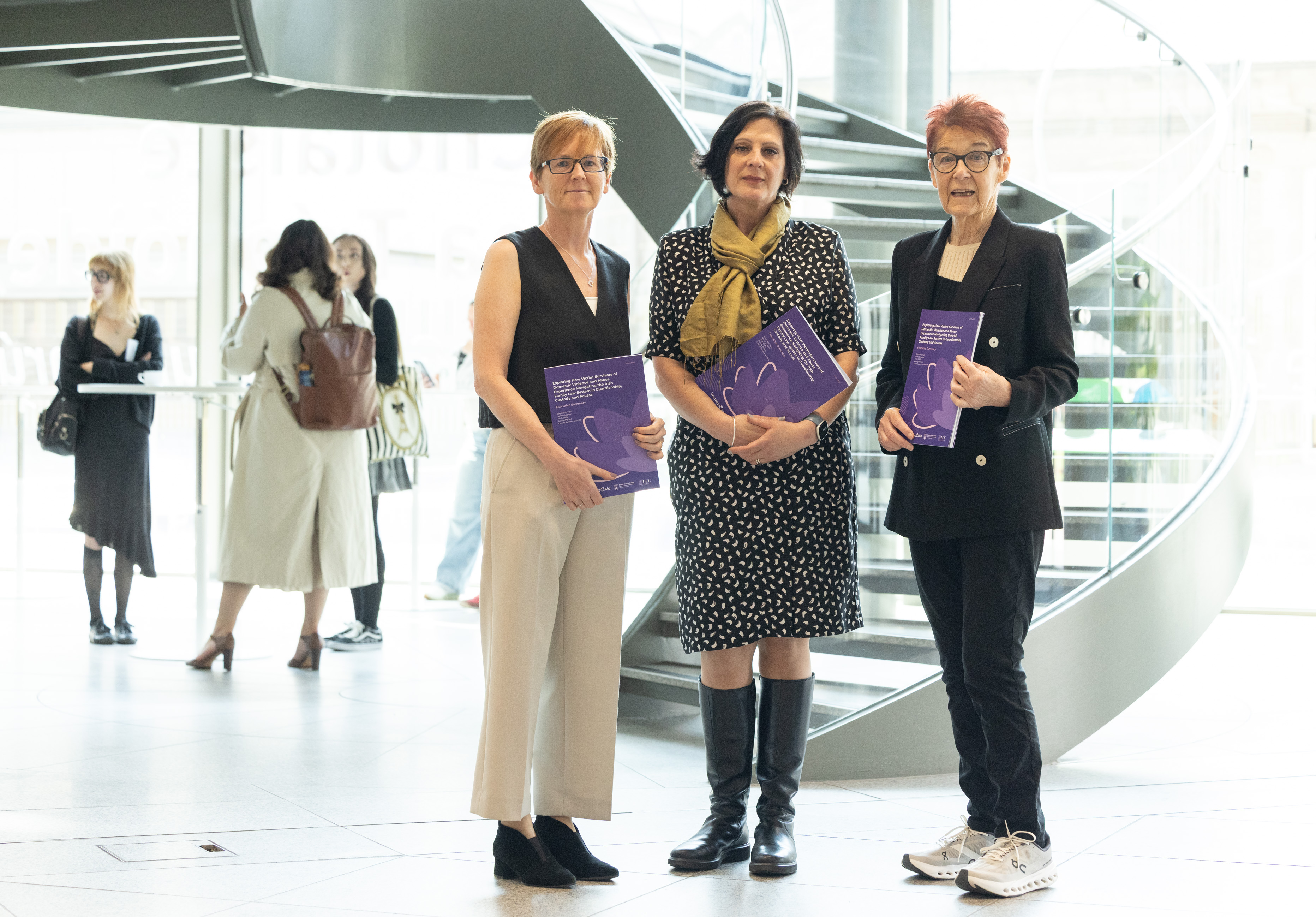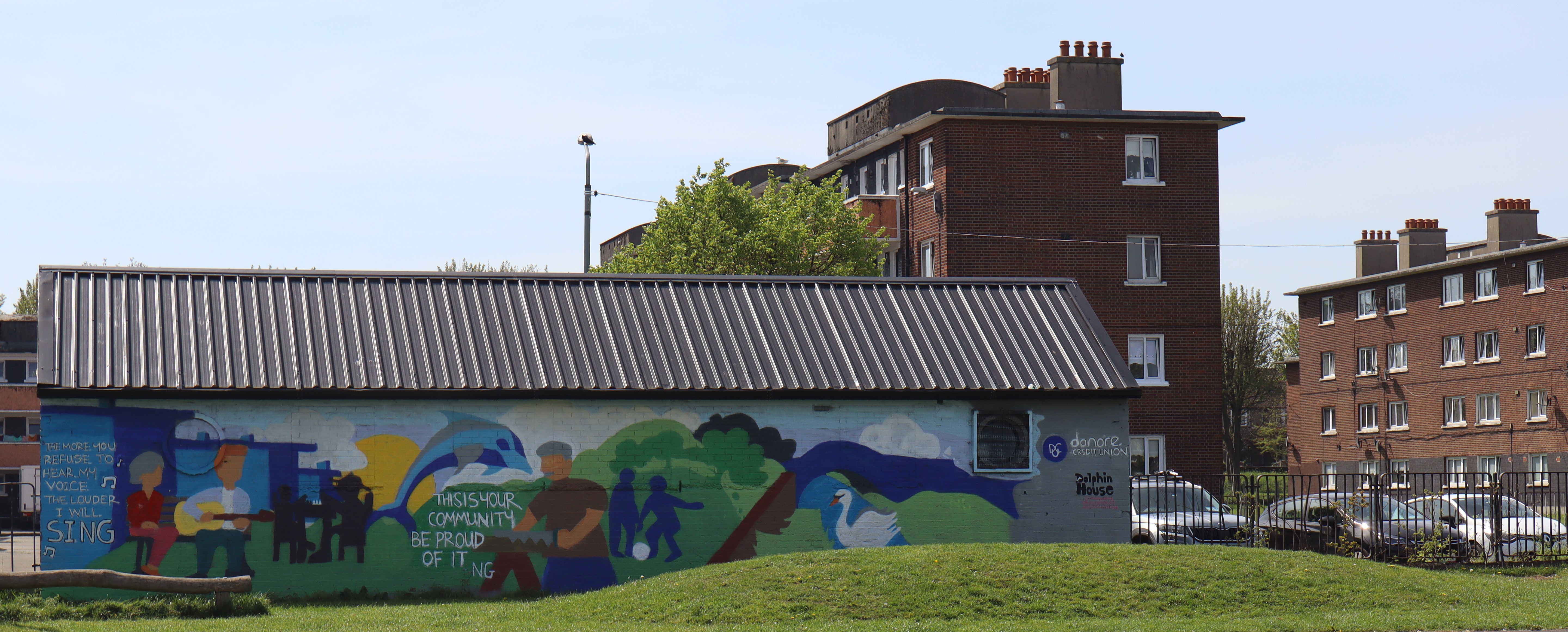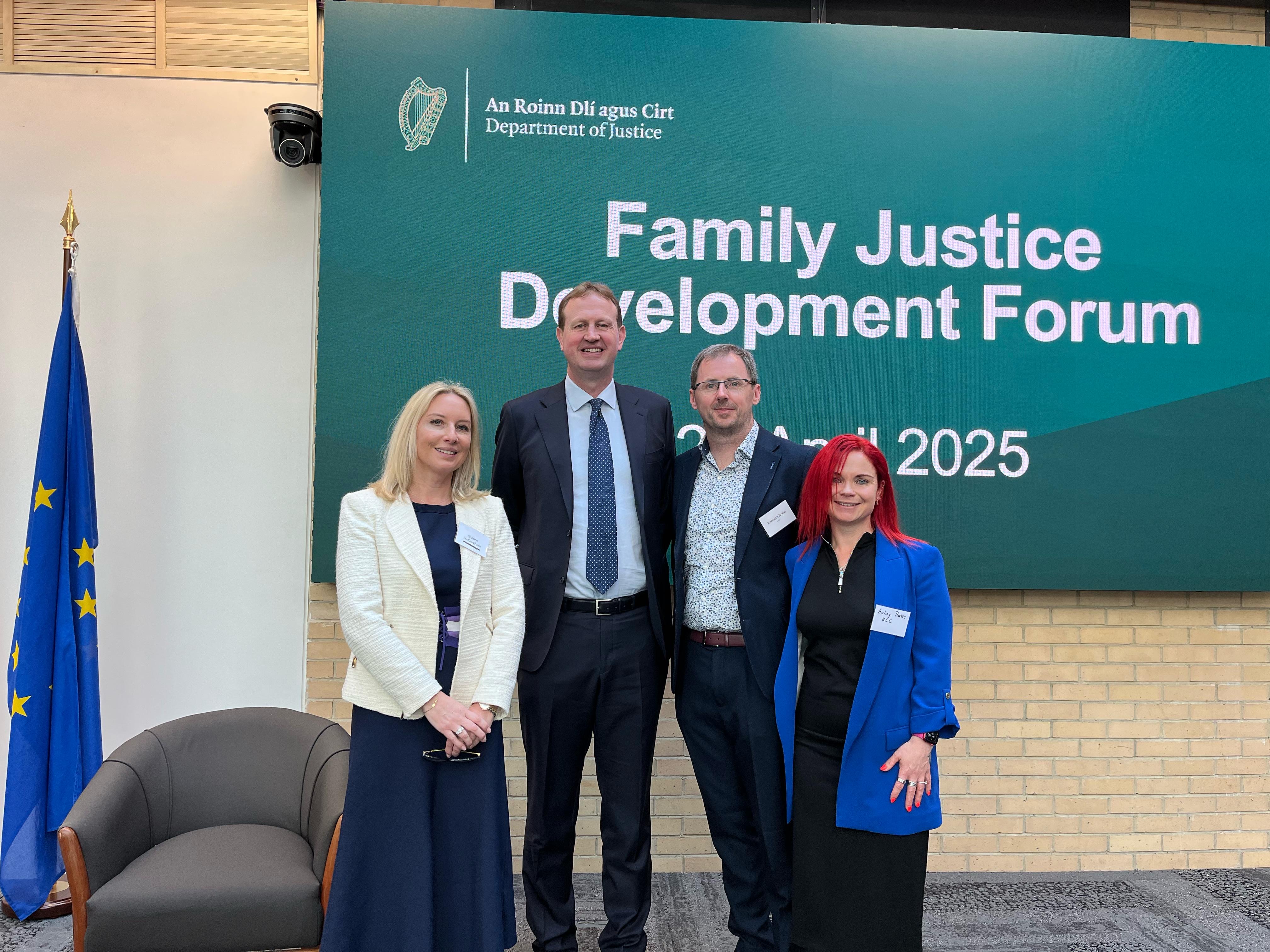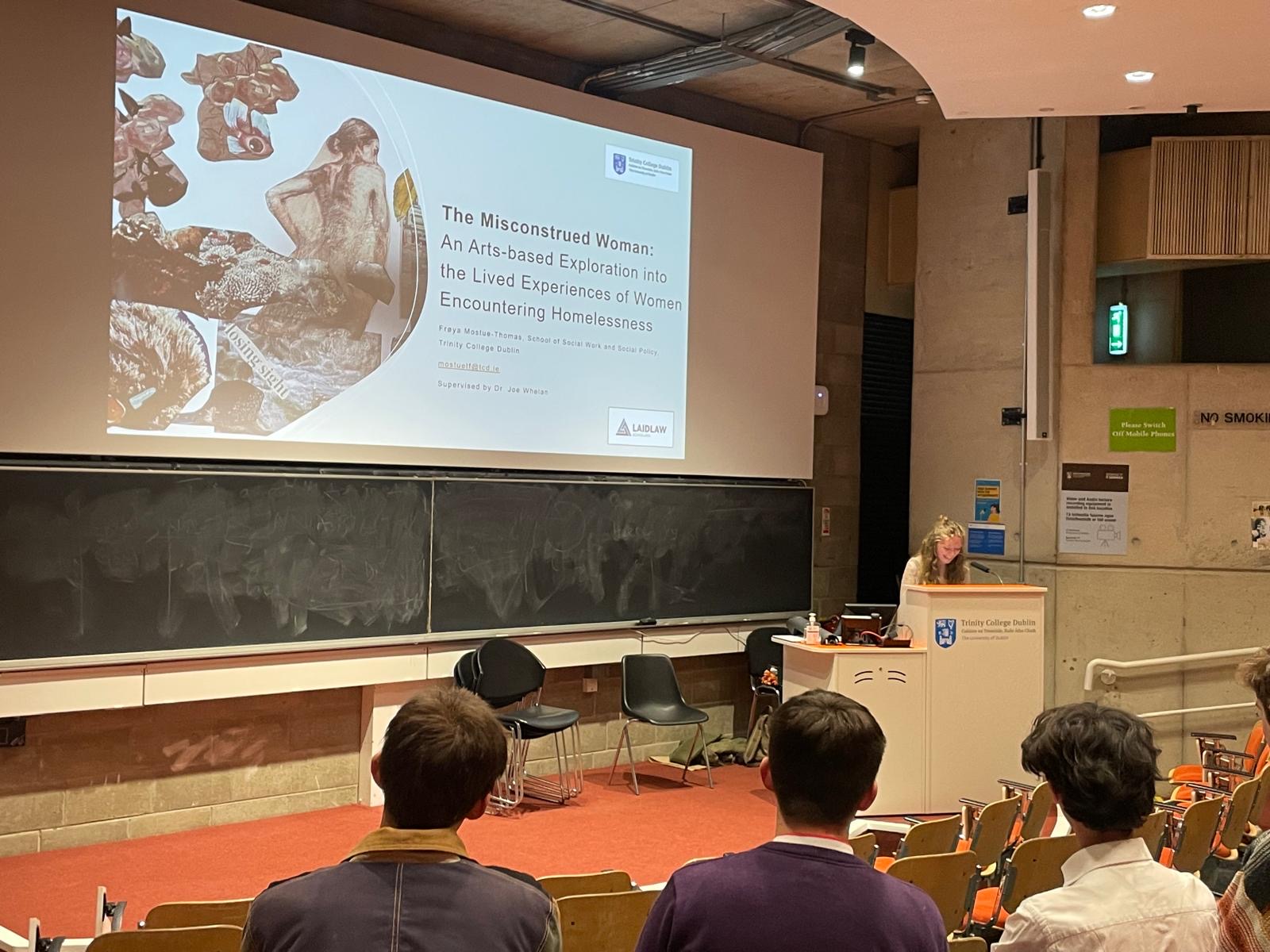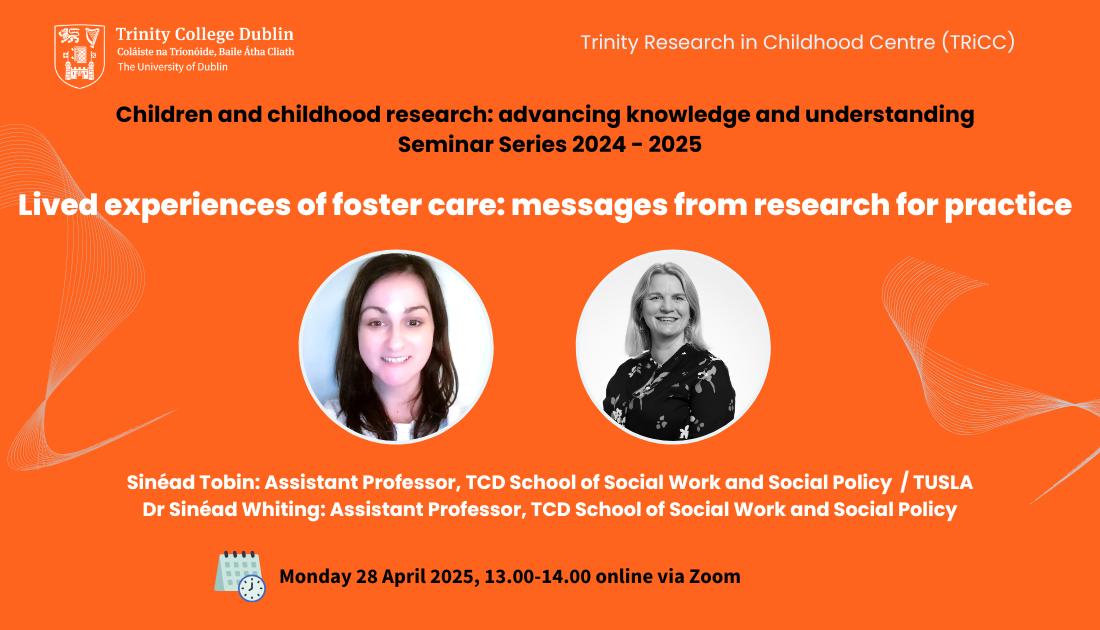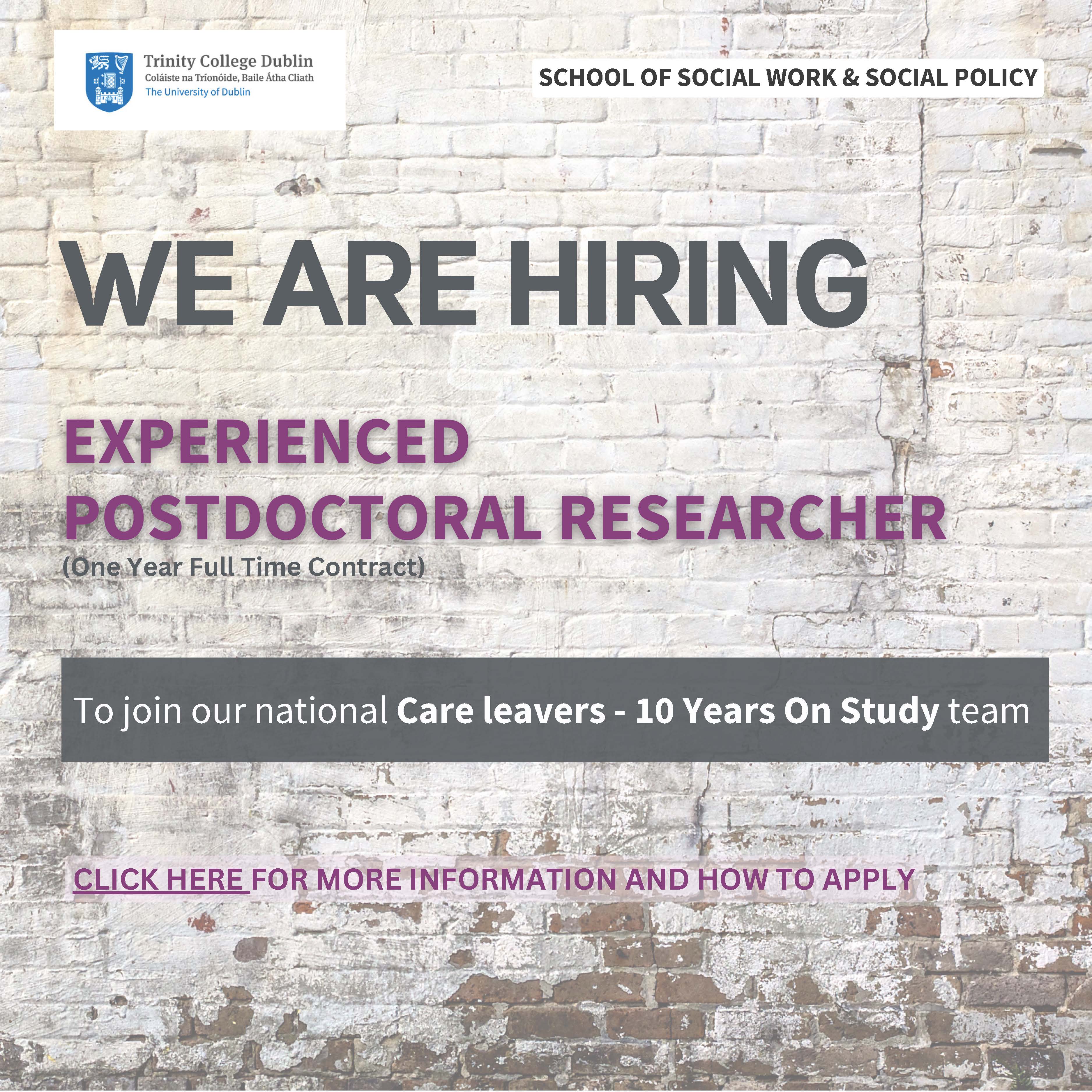Latest News
Impact Case Study: Influencing and Supporting Policy through Research
Research undertaken by the School's Assistant Professor Dr Simone McCaughren was chosen as one of four case studies to highlight the work of Trinity academics who are playing a role in influencing or supporting policymaking. The case studies form part of a set of indicators for the Higher Education Authority on the ways in which Trinity is engaging with its wider stakeholder community. To read more about this Impact Case study click here
November 3, 2025
___________________________________________________________________________________
Staff from SWSP attend the 10th National Child Protection and Welfare Conference
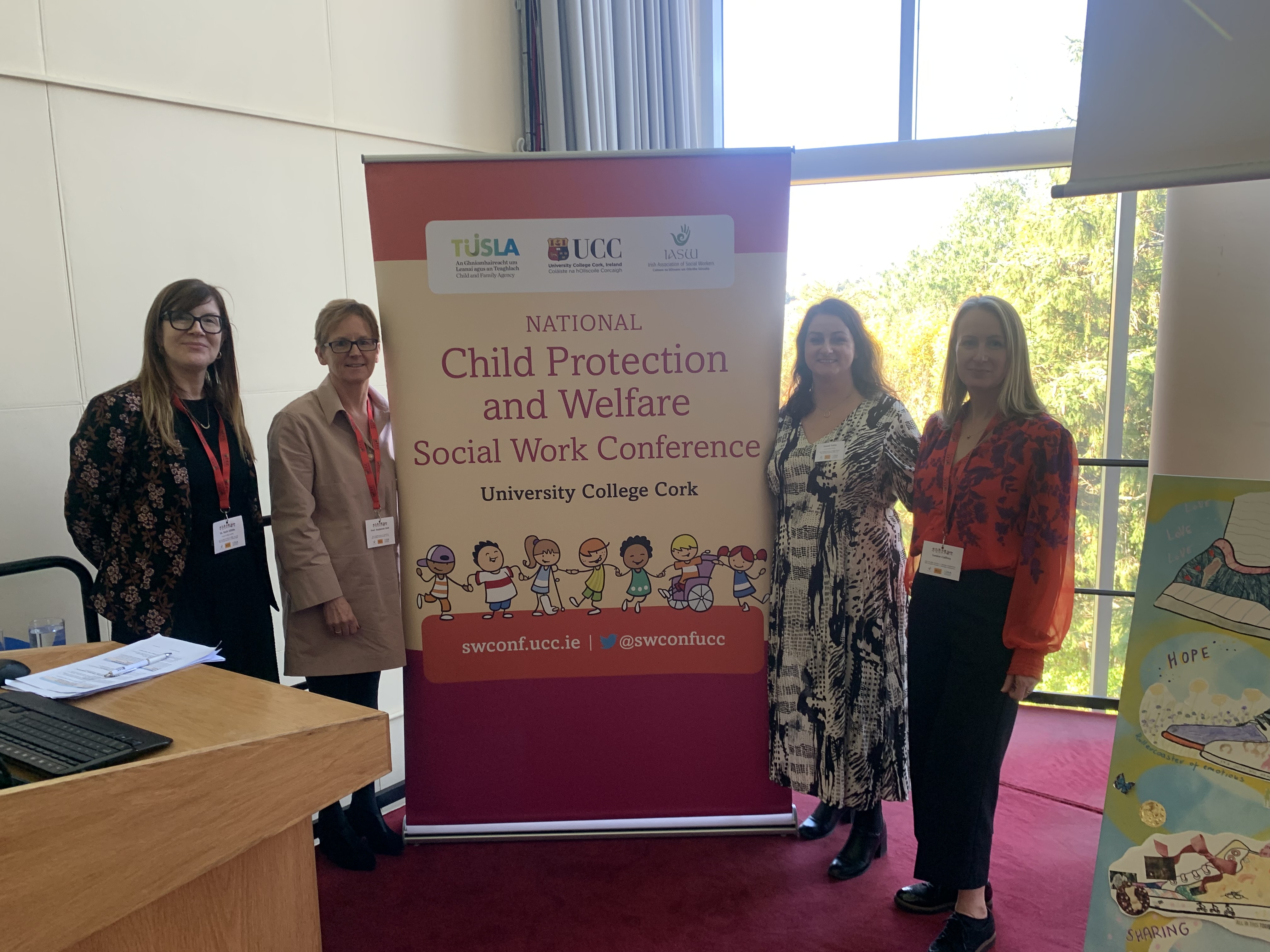
The School of Social Work and Social Policy was represented at the 10th National Child Protection and Welfare Conference in Cork on Friday 24th October. Steph Holt and Ruth Elliffe both presented papers from the Women’s Aid Commissioned study ‘Exploring How Victim-Survivors of Domestic Violence and Abuse Experience Navigating the Irish Family Law System in Guardianship, Custody and Access’ , which was published earlier this year ( https://hdl.handle.net/2262/111839). Louise Caffrey presented findings from a review of the international evidence on children’s experiences of Signs of Safety, the national framework for child protection social work practice in Ireland. The review was conducted by the following researchers from the School of Social Work and Social Policy and TCD Library: Louise Caffrey, Eavan Brady, Orla Keegan, Siobahn Dunne, Greg Sheaf, Stephanie Holt & Robbie Gilligan. Sinead Tobin attended in her capacity as Joint Appointment between Trinity College Dublin and Tusla, Child and Family Agency.
October 29, 2025
____________________________________________________________________________________________________________
Professor Nicola Carr has been reappointed to the Board of Confederation of European Probation (CEP)
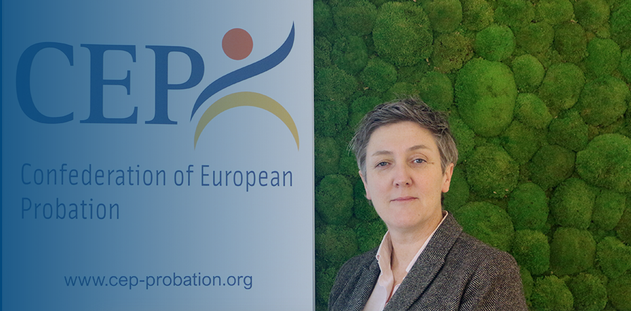 Nicola Carr attended the General Assembly of the Confederation of European Probation in Vienna on 15th October, where she was reappointed to serve a second term as a Board member of the CEP.
Nicola Carr attended the General Assembly of the Confederation of European Probation in Vienna on 15th October, where she was reappointed to serve a second term as a Board member of the CEP.
CEP is the Confederation of European Probation. It aims to promote the social inclusion of people who have offenders through community sanctions and measures such as probation, community service, mediation and conciliation. CEP is committed to enhance the profile of probation and to improve professionalism in this field, on a national and a European level.
https://www.cep-probation.org/staff/nicola-carr/
October 22, 2025
_____________________________________________________________________________________________________________
We are Hiring - Assistant Professor in Social Work (Tenure Track Post)
We are delighed to announce we are hiring an Assistant Professor in Social Work (Tenure Track Post). Full details and the job spec can be found at the following link
October 9, 2025
___________________________________________________________________________________________________________________________________________________
Congratulations to Francesca Keogh, recipient of Trinity Research Doctorate Award
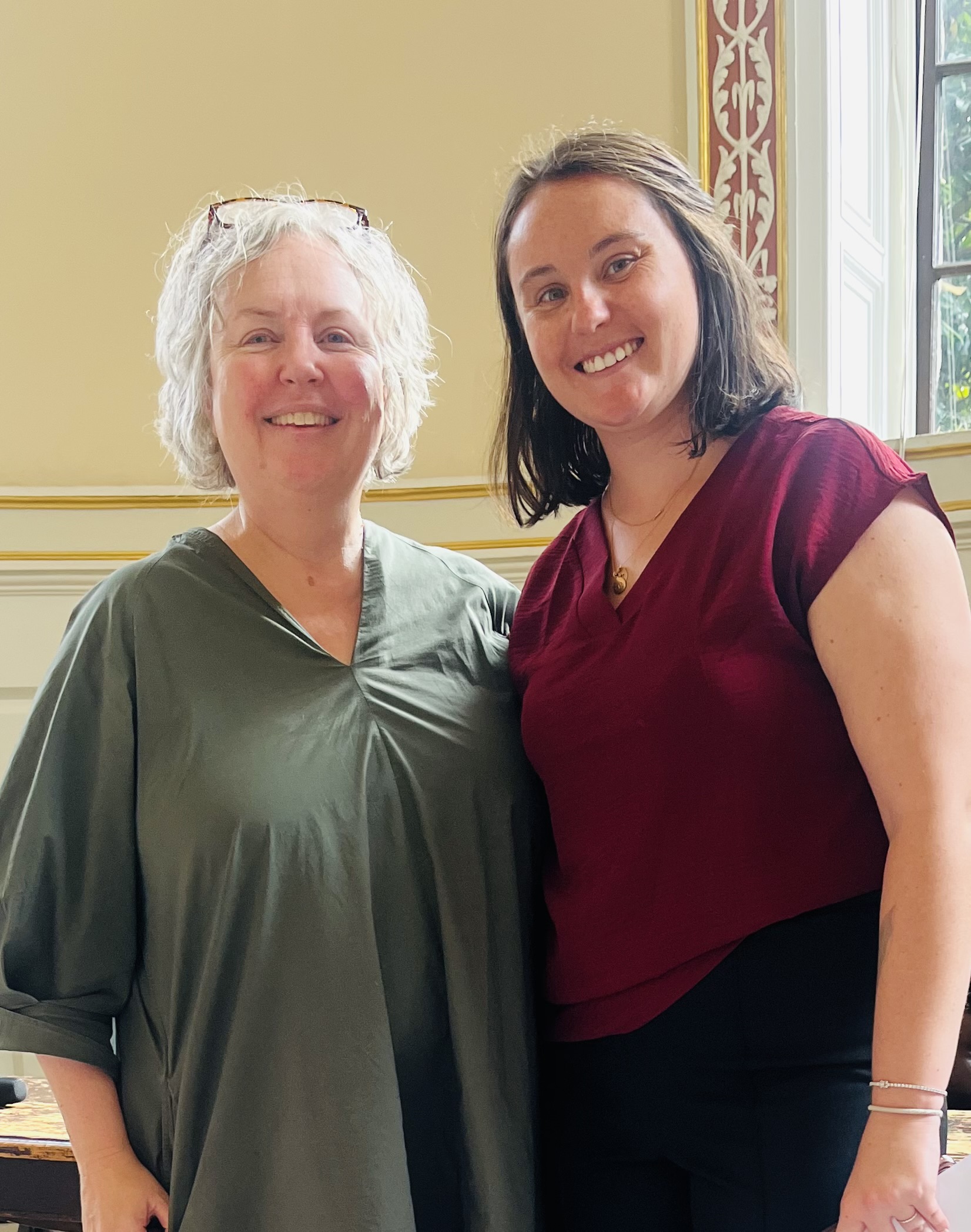 Warm congratulations to Francesca Keogh, recipient of the School’s Trinity Research Doctorate Award, 2025-2026. Francesca is photographed here with the Provost, Dr Linda Doyle, at last week’s celebration of the 2025 Award Winners in the Public Theatre, Front Square.
Warm congratulations to Francesca Keogh, recipient of the School’s Trinity Research Doctorate Award, 2025-2026. Francesca is photographed here with the Provost, Dr Linda Doyle, at last week’s celebration of the 2025 Award Winners in the Public Theatre, Front Square.
Francesca’s research will examine substance use among young people in deprived Dublin-based neighbourhoods and her academic supervisor is Associate Professor Paula Mayock.
October 8, 2025
________________________________________________________________________________________________________________________________________________________________
Dr Paula Mayock Delivers Keynote at National Women's Council Conference
Sept 16th 2025
The National Women’s Council (NWC) hosted a major conference exploring the intersection between housing precarity, homelessness interact with various forms of domestic, sexual and gender based violence (DSGBV) on September 16th, 2025, at which Associate Professor Paula Mayock delivered a key note talk. The conference was opened by Orla O’Connor, Director of the National Women’s Council and Minister for Housing, James Brown, addressed the conference via video link. Dr. Mayock’s paper, titled ‘The Intersection of Homelessness and Gender-based Violence’ examined gendered homelessness and the association between gender-based violence and the loss of housing.
Key issues addressed by the conference got extensive media coverage, including in the
Irish Times, Examiner and Independent. Dr. Mayock was also interviewed on Drivetime about the complex relationship between domestic violence and abuse and homelessness.
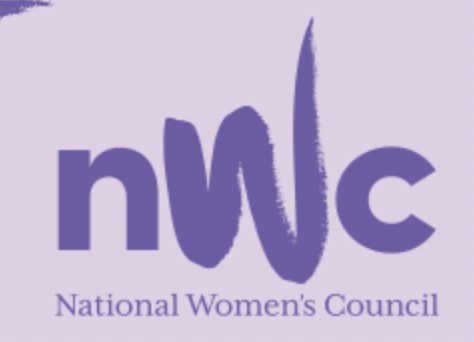
________________________________________________________________________________________________________________________________________________________________
Researchers from the School of Social Work and Social Policy welcome the public, practitioners and academics for a dissemination event on homelessness and substance use
Sept 13th 2025, Trinity Long Room Hub
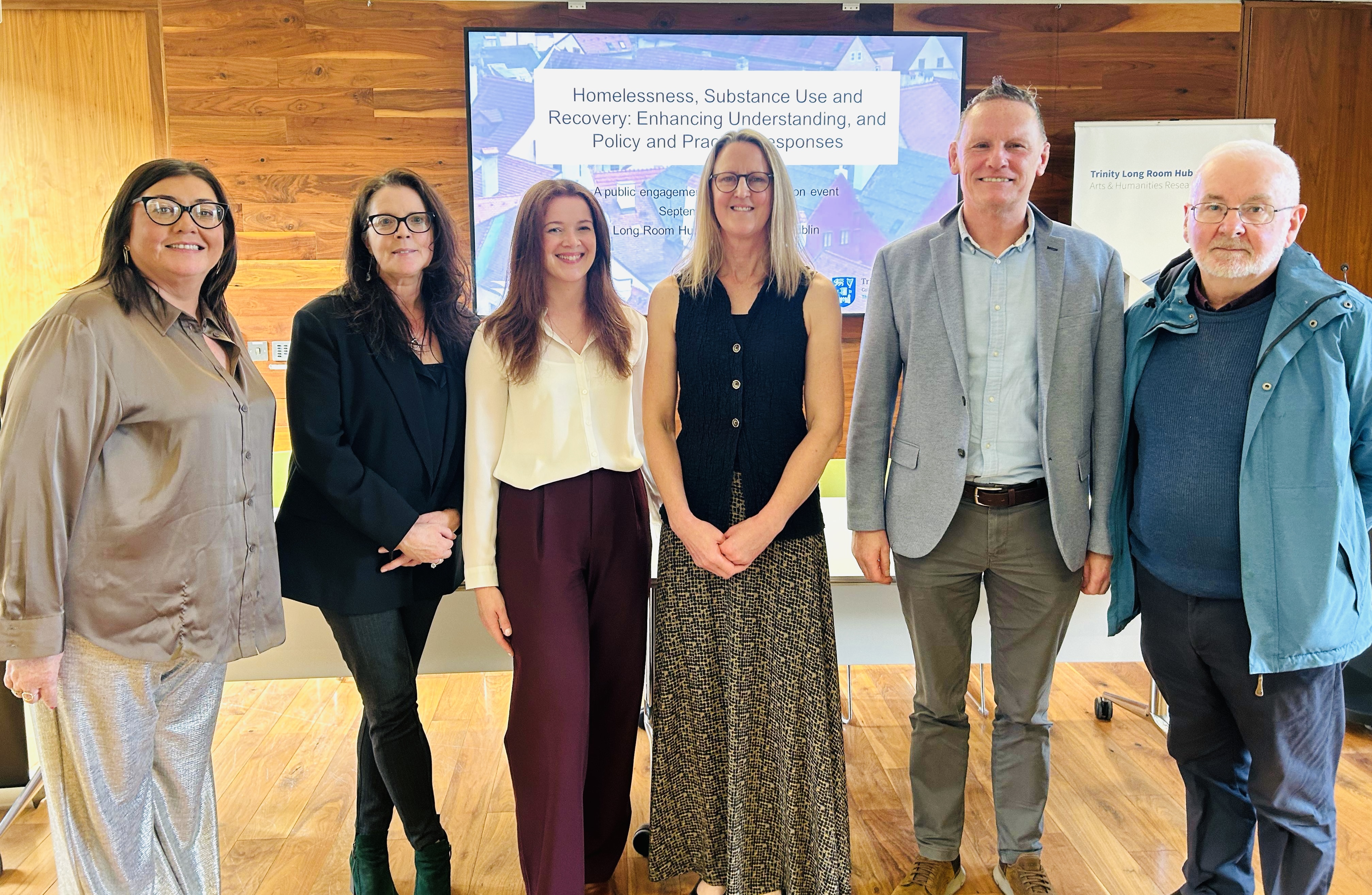
A public engagement and dissemination event took place at Trinity Long Room Hub last Friday, Sept 13th, highlighting findings from a postdoctoral research project on the lived experience of people with histories of homelessness and substance use disorder (SUD). Funded by Research Ireland, the project team included Associate Professor, Paula Mayock, Principal Investigator and Dr Branagh O’Shaughnessy, Postdoctoral Research Fellow.
Funded by TRiSS, the event brought together academic researchers, homelessness organisation representatives, policy stakeholders, practitioners working with homeless adults, and individuals with lived experience. Talks aimed to raise awareness of the study’s findings which relate to the complex intersection of homelessness and SUD, and to generate discussion about policy implications for addressing homelessness and SUD and supporting recovery trajectories.
Invited speakers included Professor Sarah Johsen, University of Edinburgh, Eddie Mullins, CEO of Merchants Quay Ireland, and Julie McKenna, Senior Health and Recovery Services Manager, NOVAS. The sessions were chaired by Dr Shane Butler, Fellow Emeritus at the School of Social Work and Social Policy.
The key findings of the study were presented including the novel contribution of recovery dynamics, and the importance of something to recover for, as highlighted by the study’s participants. Prof Sarah Johnsen responded to findings, with reflections on her research on severe and multiple disadvantage in Scotland. Practitioner-experts, Eddie Mullins and Julie McKenna presented implications for policy and practice based on reflections on their experience in the field of addiction support and homelessness services. The event closed with an open Q&A session between the panel and attendees.
The event was well-subscribed and the organisers hope it will be one of many contributions to the ongoing conversation about recovery in the context of homelessness and SUD.
September 23, 2025
Professor Nicola Carr is one of the editors (with Harry Annison and Tom Guiney) of a new book on parole – Parole Futures. Rationalities, Institutions and Practices – published by Bloomsbury
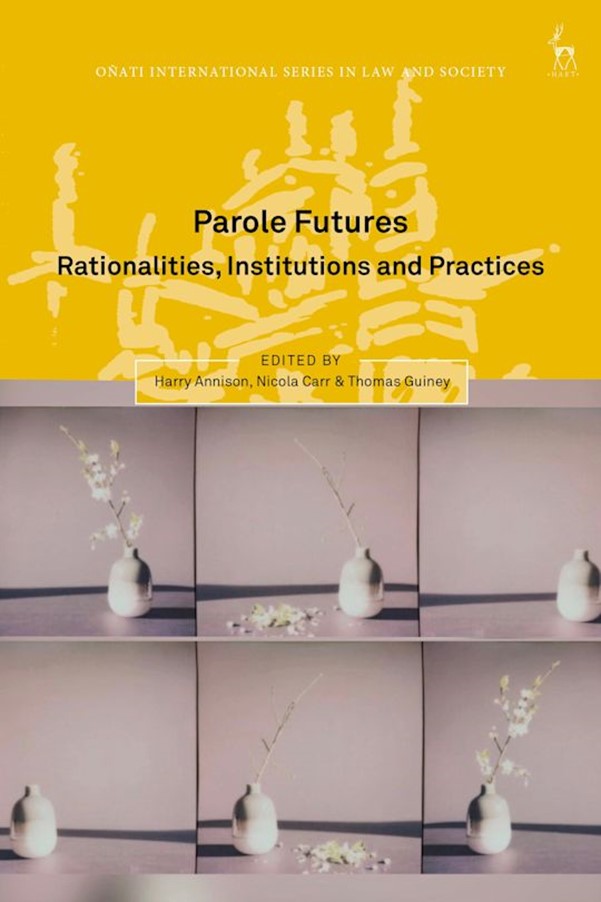
Book Description
Does parole have a future? If it does, can we begin to imagine a different path? Is progressive penal reform possible, or has the time come to consider more radical alternatives in a context where there is little, if any, consensus on the underlying aims and techniques of contemporary prison release? What does this all mean for the prisoners, families, victims and publics upon whose confidence the parole system ultimately depends?
This book brings together a world-leading panel of 27 experts who draw upon insights from law, sociology, criminology and political science to explore these pressing questions. At a time when many parole systems are experiencing considerable strain, the aims of this collection are twofold: first, to encourage systematic and critical reflection on the rationalities, institutions and practices of parole. Second, to think big, and pose ambitious 'what if' questions about the possible futures of parole and prison release.
Offering novel insights from Asia, Australia, Europe, North America and South America, this collection builds the case for, and then showcases, a 'way of doing' parole research that is global in outlook, interdisciplinary in approach and unapologetically normative in character.
The editors and contributors will be discussing the book at specially convened roundtable at the European Society of Criminology in Athens on September 4th, 2025.
A link to the book can be found here
August 19, 2025
Dr Kate Antosik-Parsons and Dr Catherine Conlon are excited to announce the publication "Gender, nation and reproduction in the afterward of repeal and decriminalisation" in the Irish Journal of Sociology
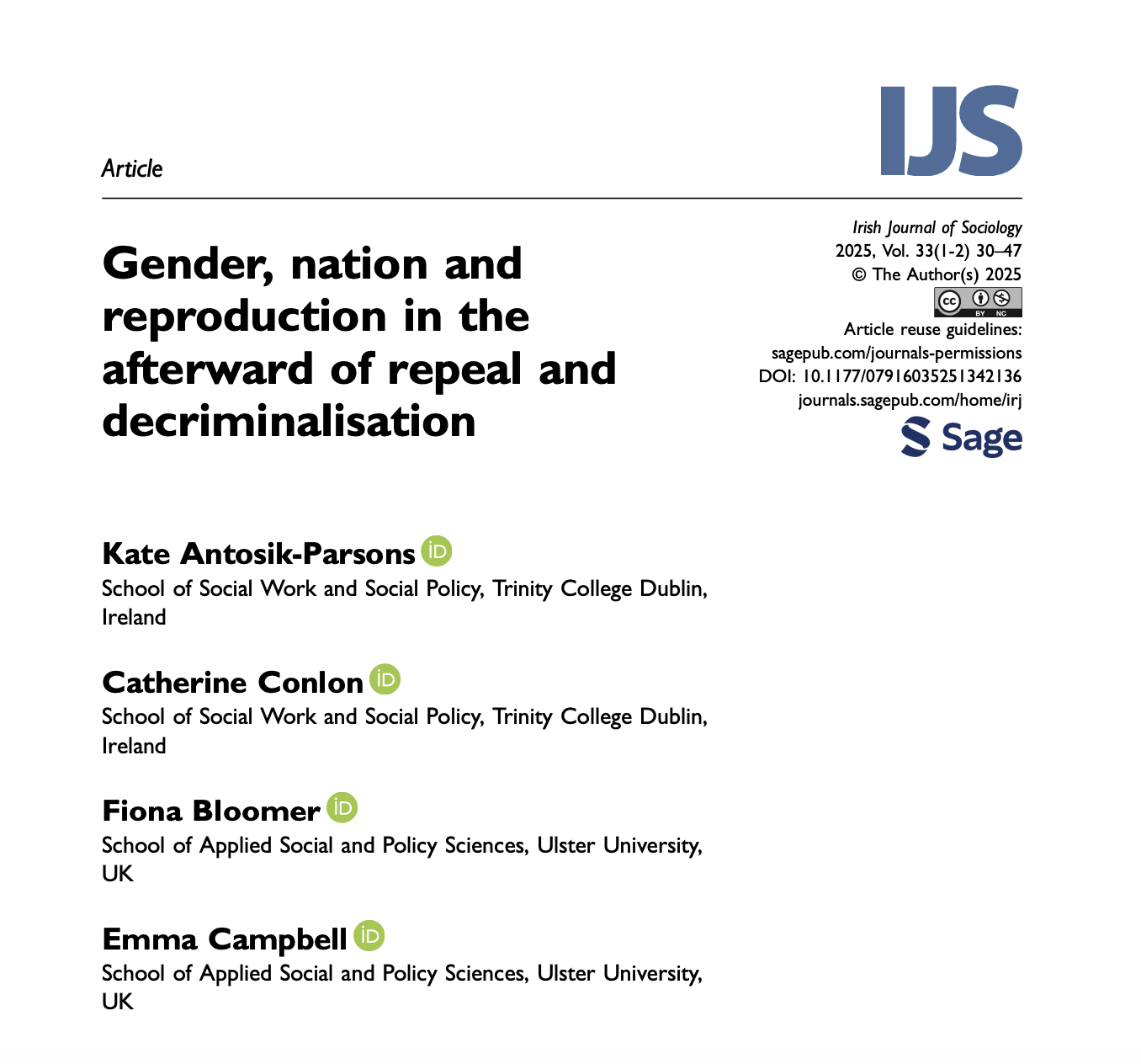
The article co-authored by the ReproCit team Kate Antosik-Parsons, Catherine Conlon, Fiona Bloomer (Ulster University) and Emma Campbell (Ulster University) "Gender, nation and reproduction in the afterward of repeal and decriminalisation" has been published in the Special Issue: After the Review: What Next for Irish Abortion Services? in the Irish Journal of Sociology.
This article sketches out a conceptual framework for Reproductive Citizenship, expanding upon Bryan Turner's initial formulation of reproductive citizenship to encompass abortion. It features a second iteration of analysis of qualitative data-capturing experiences of accessing abortion in the Republic of Ireland between 2019 and 2021 alongside qualitative datasets from Northern Ireland to look at abortion experiences on an all-island basis. It proposes reproductive citizenship as generative in facilitating conceptualising abortion as lived, relational, embodied or fleshy when mobilised as a reproductive capacity.
The article is drawn from the larger Reproductive Citizenship study, an all-island research study looking at abortion on the island of Ireland, bringing together datasets for secondary analysis complemented with primary data collection.
The ReproCit Project was a HEA-funded North South Research Programme Project.
Citation: Antosik-Parsons, K., Conlon, C., Bloomer, F., & Campbell, E. (2025). Gender, nation and reproduction in the afterward of repeal and decriminalisation. Irish Journal of Sociology, 33(1-2), 30-47. https://doi.org/10.1177/07916035251342136
Other outputs from the ReproCit project can be found here.
August 08, 2025
Congratulations to Dr Catherine Conlon and Dr Kate Antosik-Parsons on the publication of the Special Issue: After the Review: What Next for Irish Abortion Services?
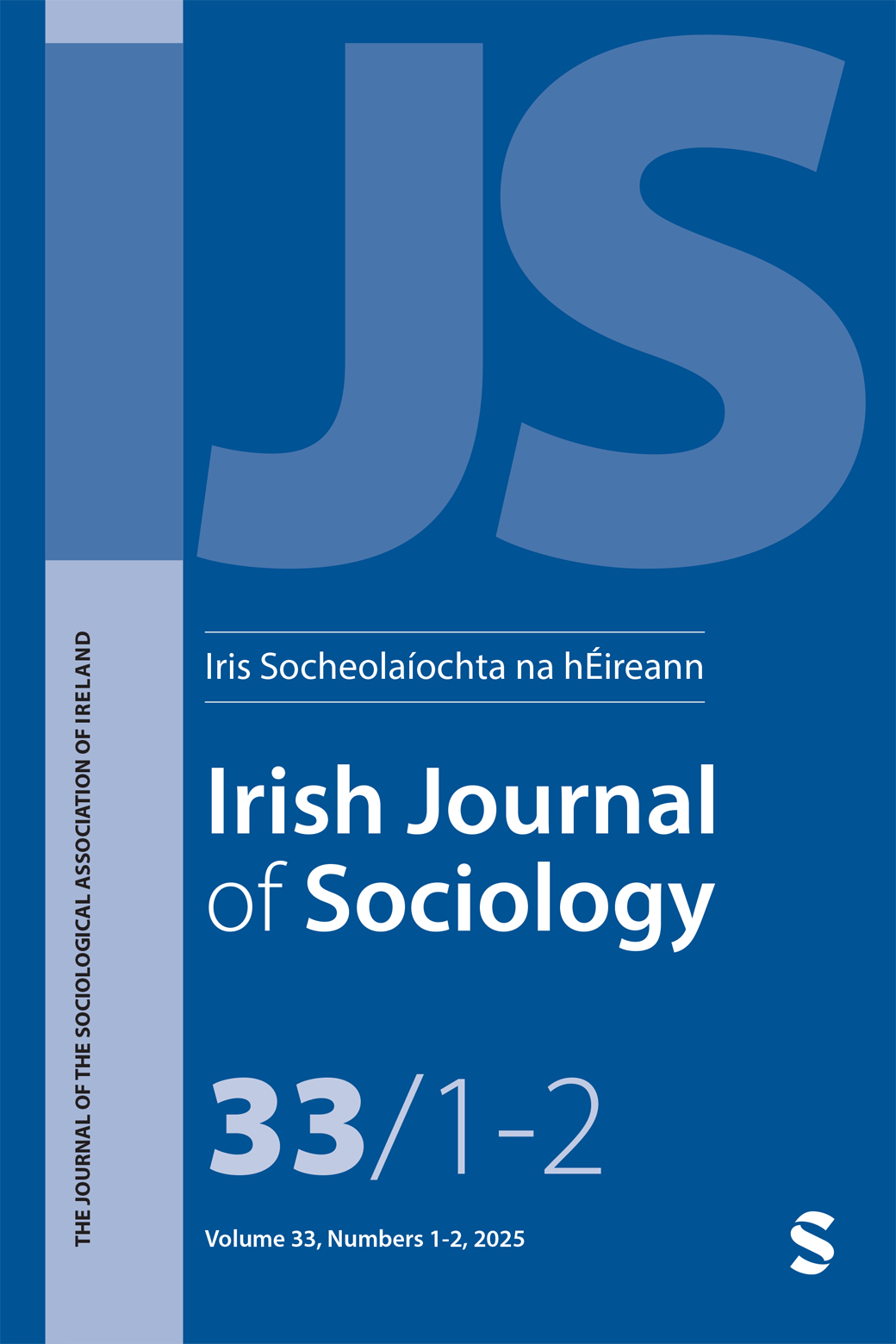
Dr Catherine Conlon (Associate Professor, School of Social Work and Social Policy) and Dr Kate Antosik-Parsons (Post-Doctoral Research Fellow, School of Social Work and Social Policy), along with Dr Deirdre Duffy (Lancaster University), are delighted to announce the publication of the Irish Journal of Sociology Special Issue: After the Review: What Next for Irish Abortion Services?
This special issue, edited by Kate Antosik-Parsons, Catherine Conlon and Deirdre Duffy makes a significant contribution as it explores the changing landscape of abortion in Ireland from multiple perspectives, using a diverse range of methodological lenses and ways of knowing and speaking. It takes an interdisciplinary approach, embracing the different ways that actors within this landscape research and write about change, and drawing together overviews of the implementation of services with propositions for moving forwards. Importantly, it offers insights for other jurisdictions as well as scholars working on reproductive politics, health, and abortion beyond Ireland.
All articles are available open access.
Editorial
Kate Antosik-Parsons, Catherine Conlon and Deirdre N. Duffy
After the review: What next for Irish abortion services? Introduction to the
special issue
Articles
Kathryn Ammon and Catherine Conlon
From choice to labour: Understanding ‘aborting labour’ in Irish at-home
early medication abortion experiences
Kate Antosik-Parsons, Catherine Conlon, Fiona Bloomer and Emma Campbell
Gender, nation and reproduction in the afterward of repeal and
decriminalisation
Claire Murray and Mary Donnelly
Providing abortion care: Navigating the regulatory framework
Deirdre Duffy and Lorraine Grimes
More than committed providers: Healthcare providers, practice learning and
building abortion services in Ireland
Alana Farrell
After The Review: Law, abortion, reform and the legacies of information
restrictions
Mary Favier and Catherine Conlon
Abortion provision in Ireland: Implementation and advocacy, an Irish and
international perspective from practice
Ruth Fletcher
Witnessing legal sources of time for better abortion care
Carolina Uribe, Katie L. Togher, Sara Leitao, Keelin O’Donoghue and Deirdre Hayes-Ryan
Termination of early pregnancy in Ireland: Review of the first four years of
inpatient service at a tertiary maternity unit
Charlotte Waltz
Ethnographic fiction as feminist practice: Reflections on approaches to lived experiences in post-legalisation abortion governance in Ireland
August 08, 2025
Congratulations to the Postgraduate Diploma in Social Policy & Practice Students who recently graduated
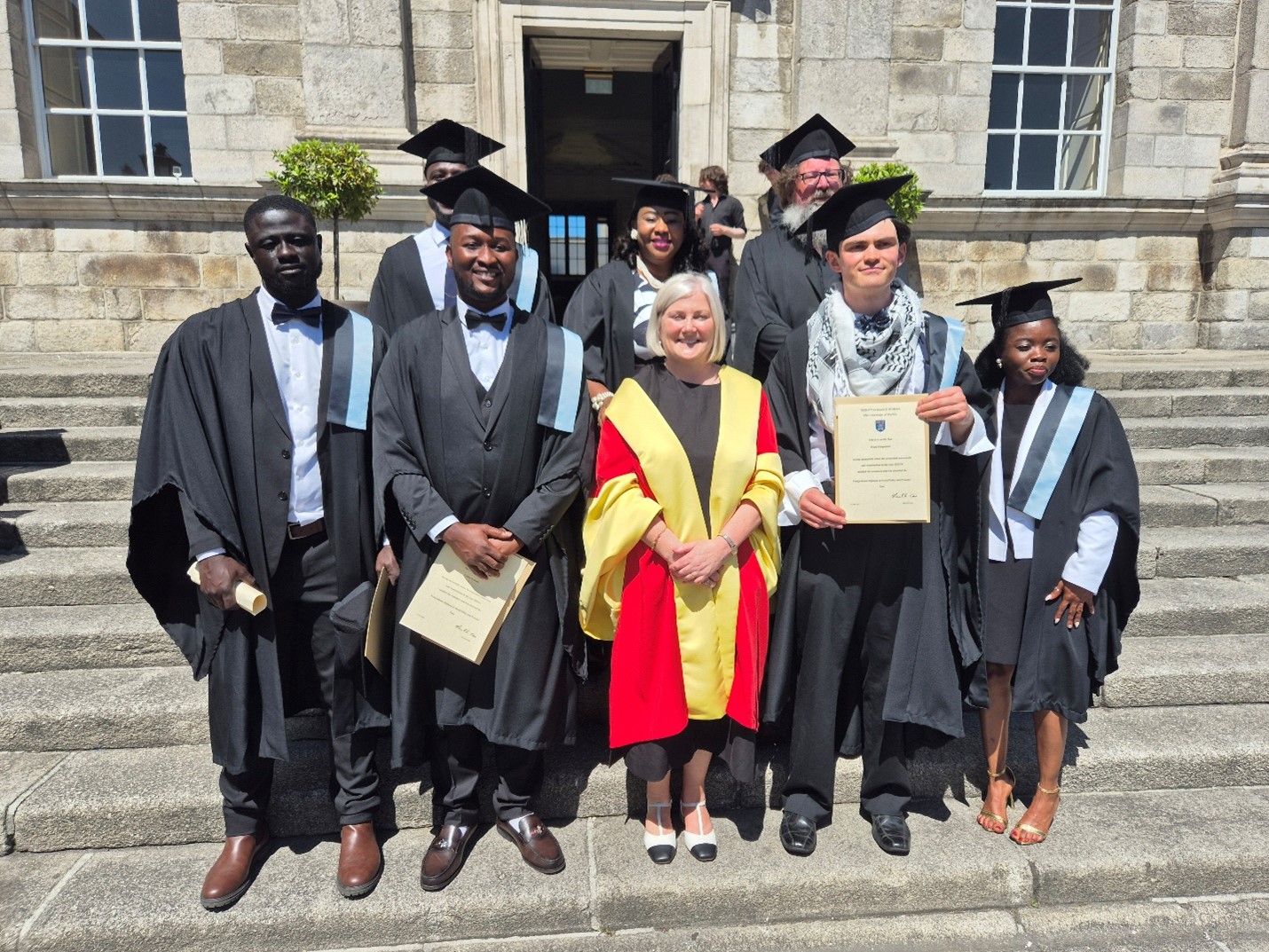 The graduation ceremony for our ‘Social Policy and Practice PGDip’ class of 2023/24 took place on 11th July, among a large group of TCD graduates. It was a pleasure to meet many of the SPP students and their proud family members, and to chat in the glorious sunshine in Front Square.
The graduation ceremony for our ‘Social Policy and Practice PGDip’ class of 2023/24 took place on 11th July, among a large group of TCD graduates. It was a pleasure to meet many of the SPP students and their proud family members, and to chat in the glorious sunshine in Front Square.
July 17, 2025
National survey of intercountry adoption experiences launches

A new national survey of the lived experience of intercounty adoption for parents of children aged 0-12 has been launched this week by Dr Simone McCaughren in the School of Social Work and Social Policy in TCD and University College Cork. The survey forms part of a study exploring the experience of intercountry adoption from the perspectives of children (aged 0-12 years) and their families and has been commission by the Adoption Authority of Ireland. The survey can be accessed here.
July 17, 2025
Disability and Child Welfare Summer School is a great success!
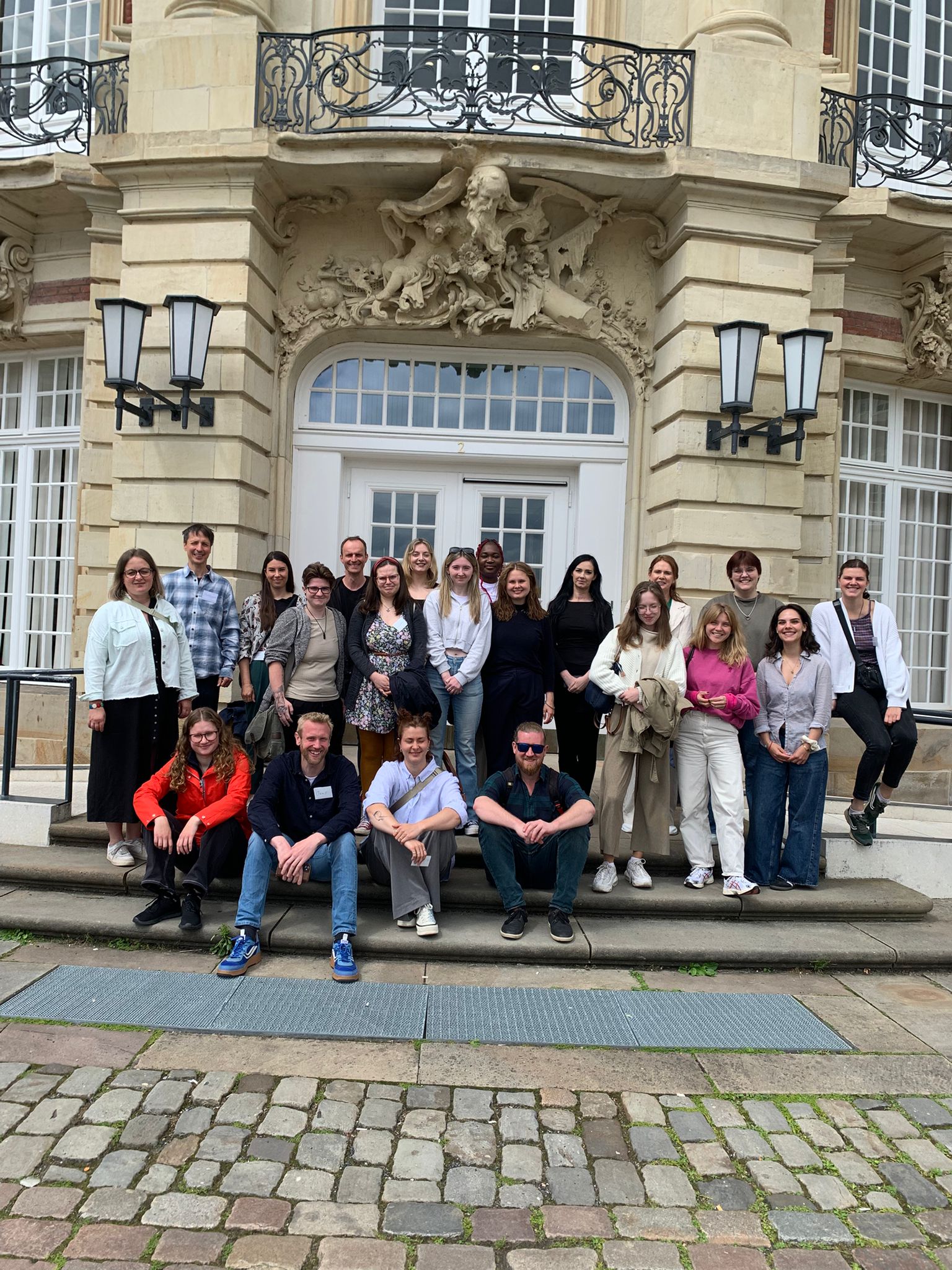
Students from the School of Social Work and Social Policy travelled to Münster Germany with Professor Susan Flynn and Ms Rose Doolan Maher to take part in a week of lectures and workshops from subject experts on disability and child welfare including experts by experience. A historic city tour of Münster and dining out were among activities to help with soaking up German culture and atmosphere. Students from four Universities across Ireland, Austria and Germany came together to learn together. As one student commented, “It not only was a SUPERBLY done academic program relevant for our degree, but I believe this has created lasting friendships across countries!... If I had to rate the opportunity on a scale of 1-10, I would give it a 20 out of 10”
Susan and Rose organised the summer school along with Professor Onno Husen, Professor Katrin Hermsen, Professor Eva van Koolwijk (all from University of Münster); Dr Rahel More (from University of Vienna); and Prof. Florian Eßer (from Osnabrück University). Professor Onno Husen led out with the initial idea and plans for the Summer School.
June 23, 2025
Congratulations to our Bachelor in Social Studies (Social Work) class of 2025 who recently graduated
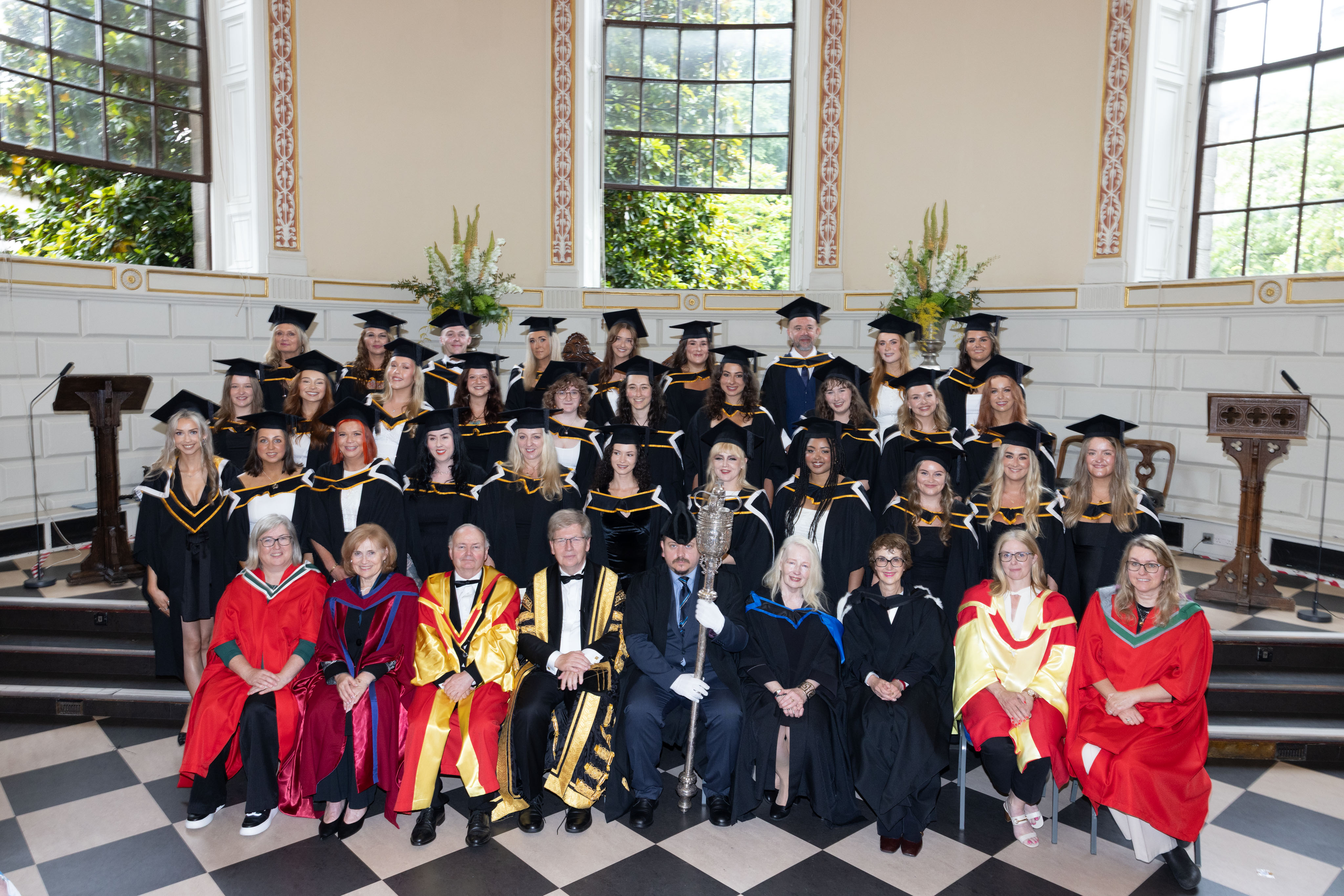
Warm congratulations to everyone who graduated last Thursday. We hope you had a wonderful day celebrating your success and we wish you the very best for the future as you move on to a new and exciting chapter in your lives.
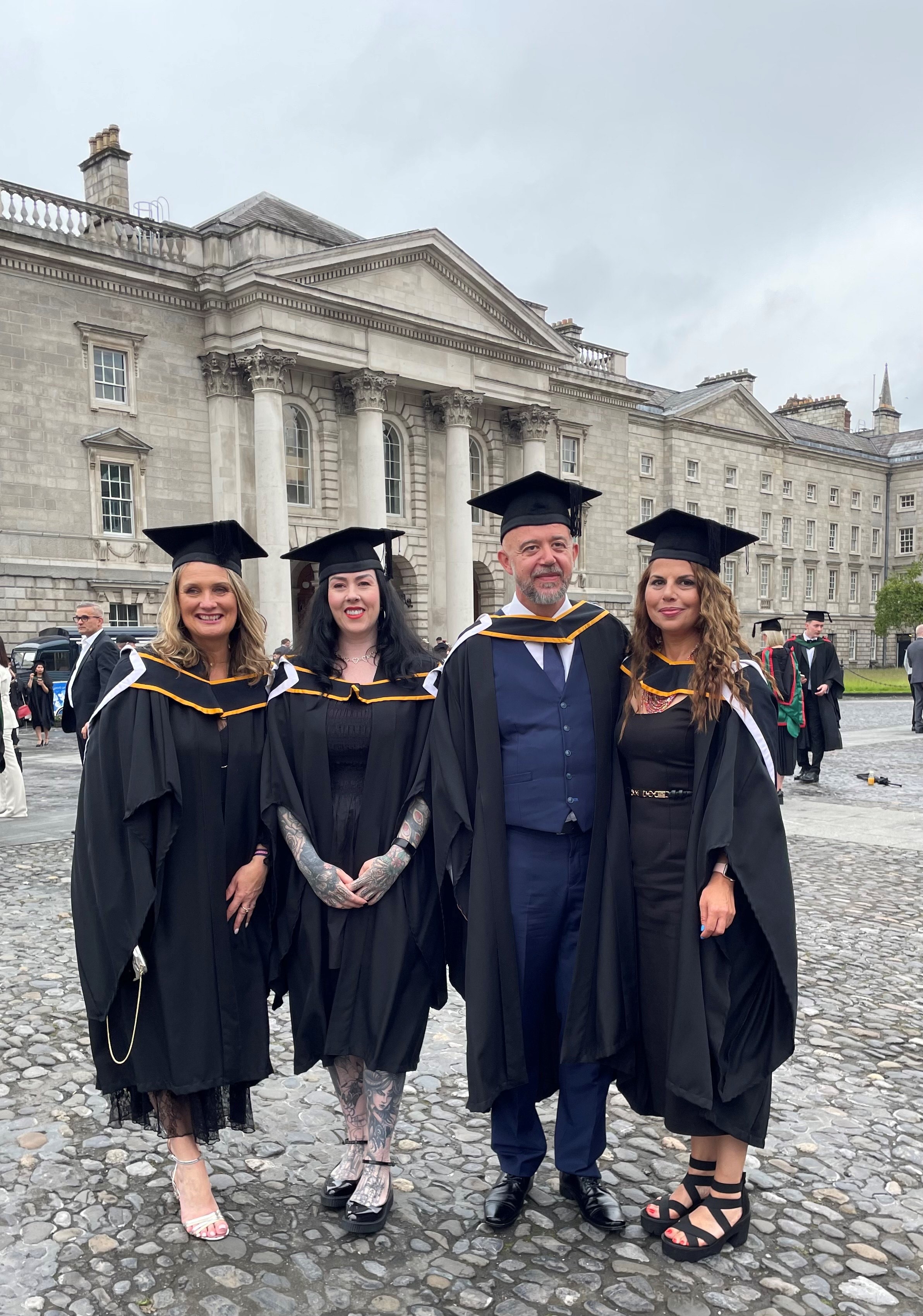
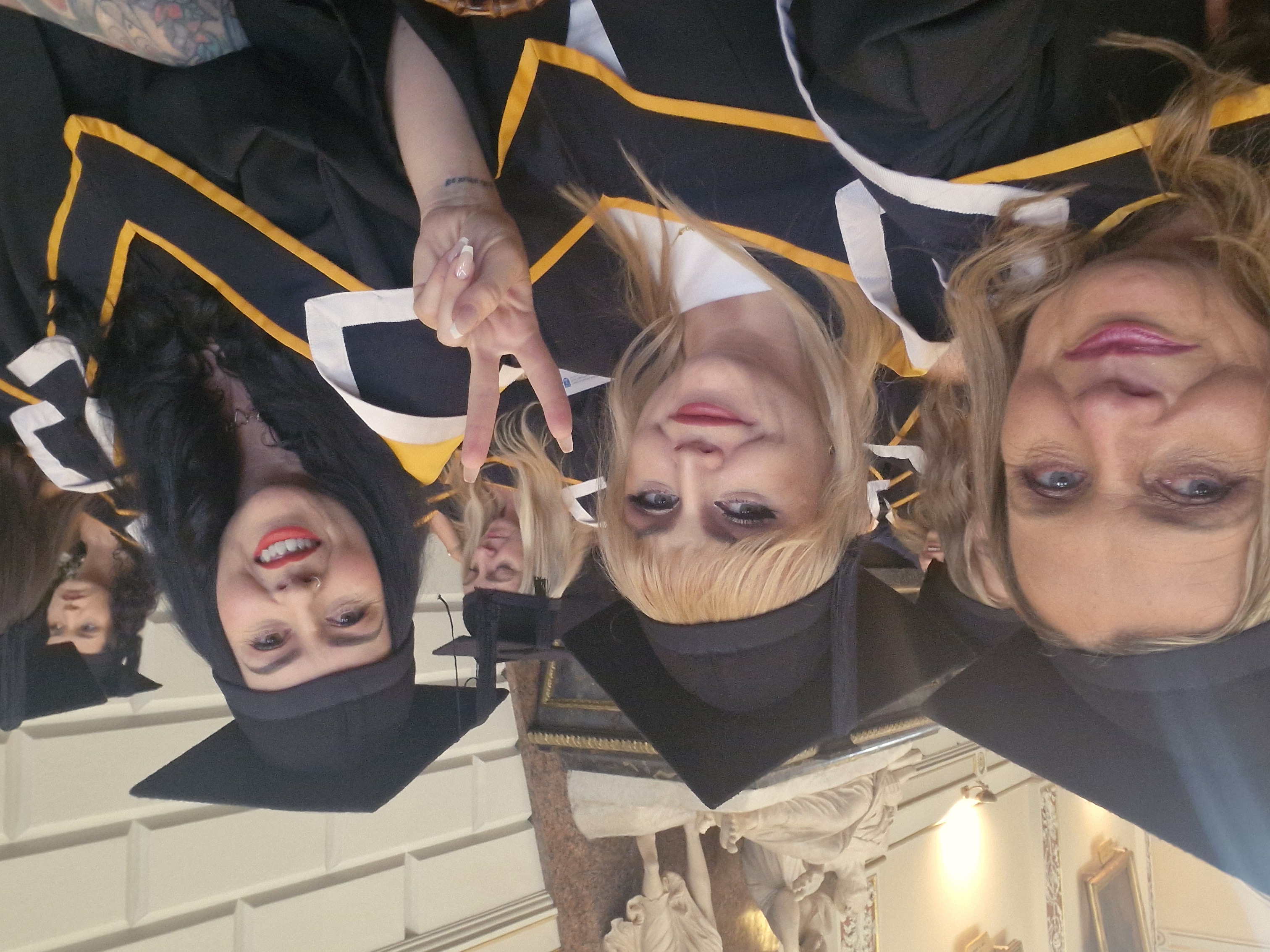
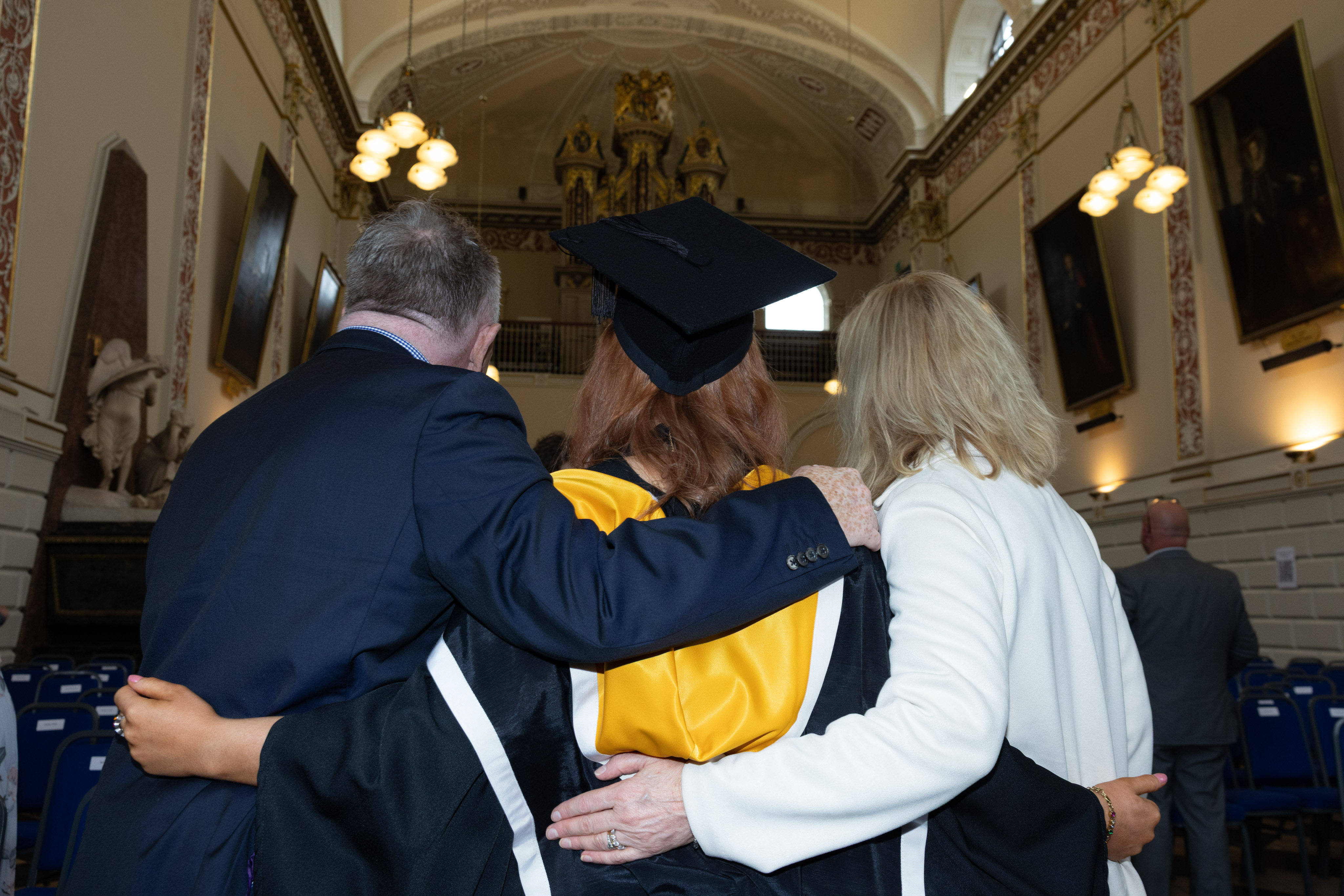
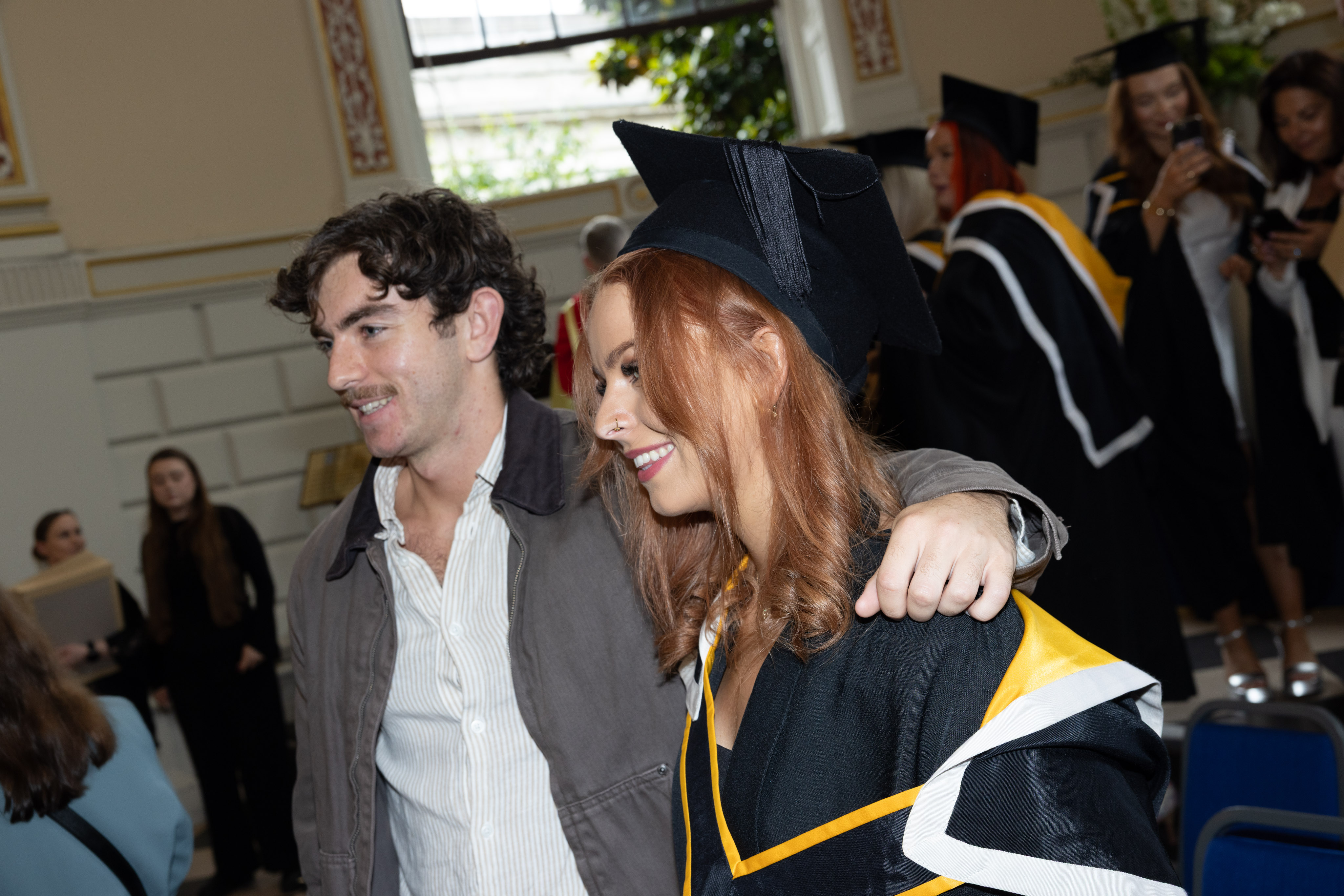
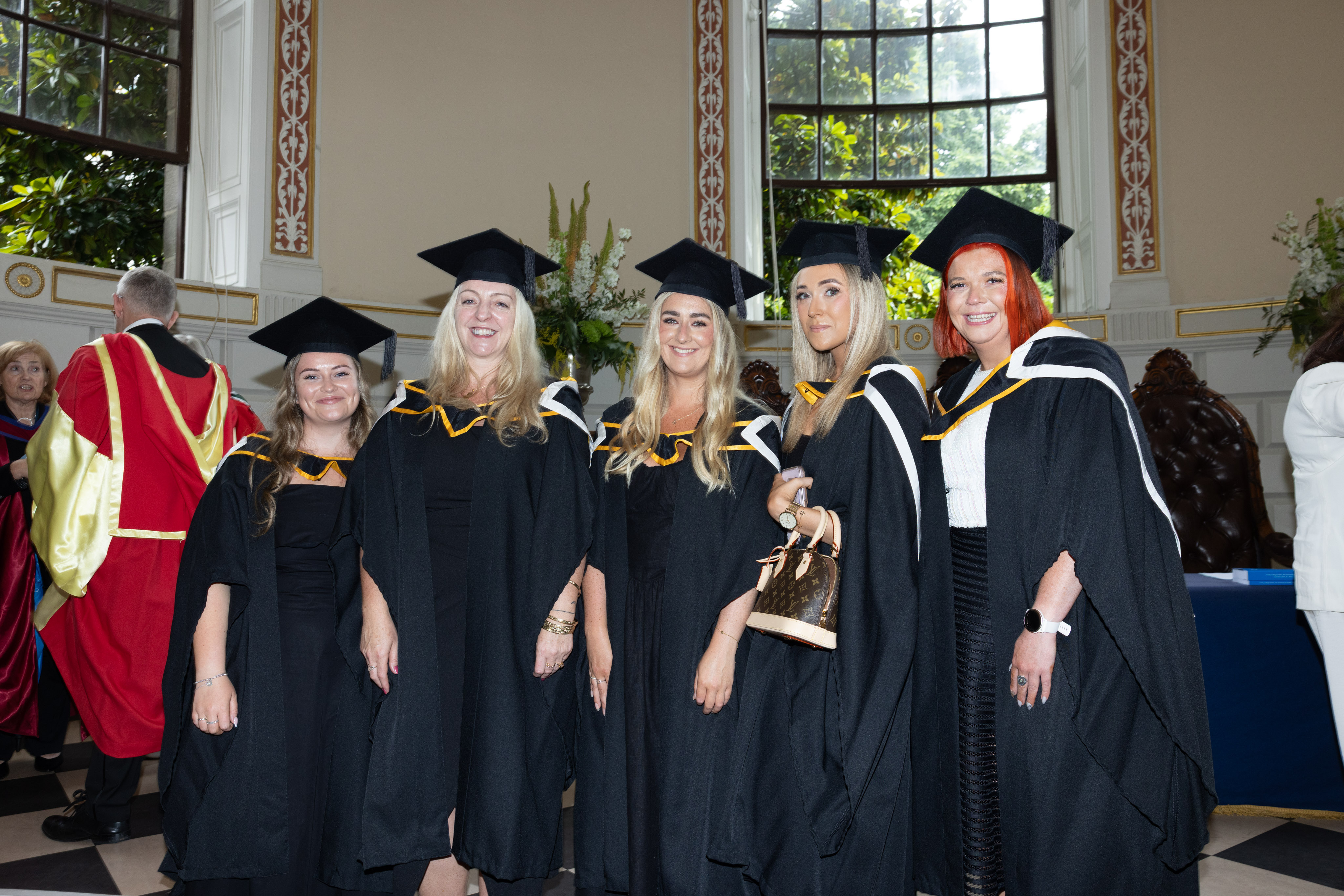
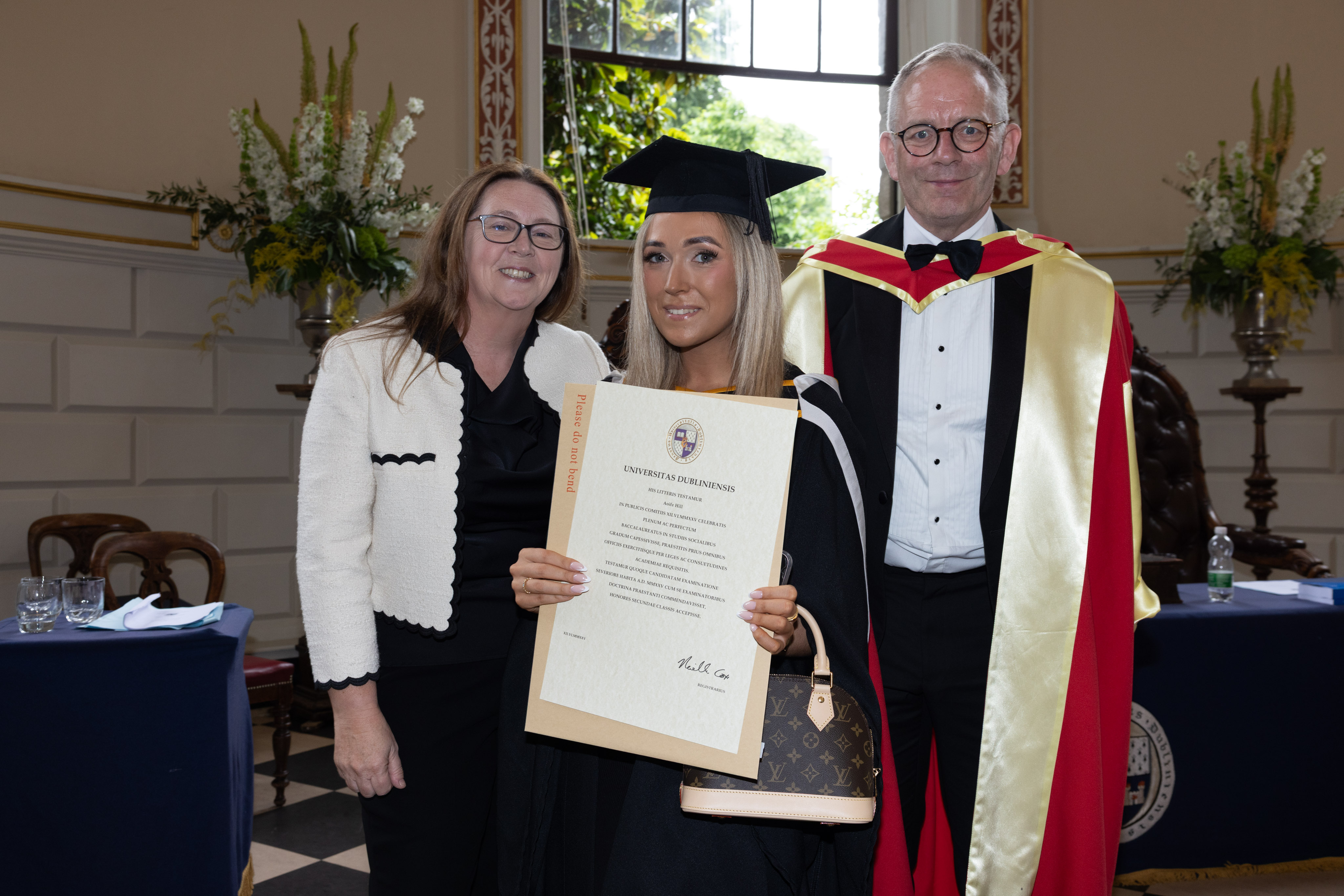
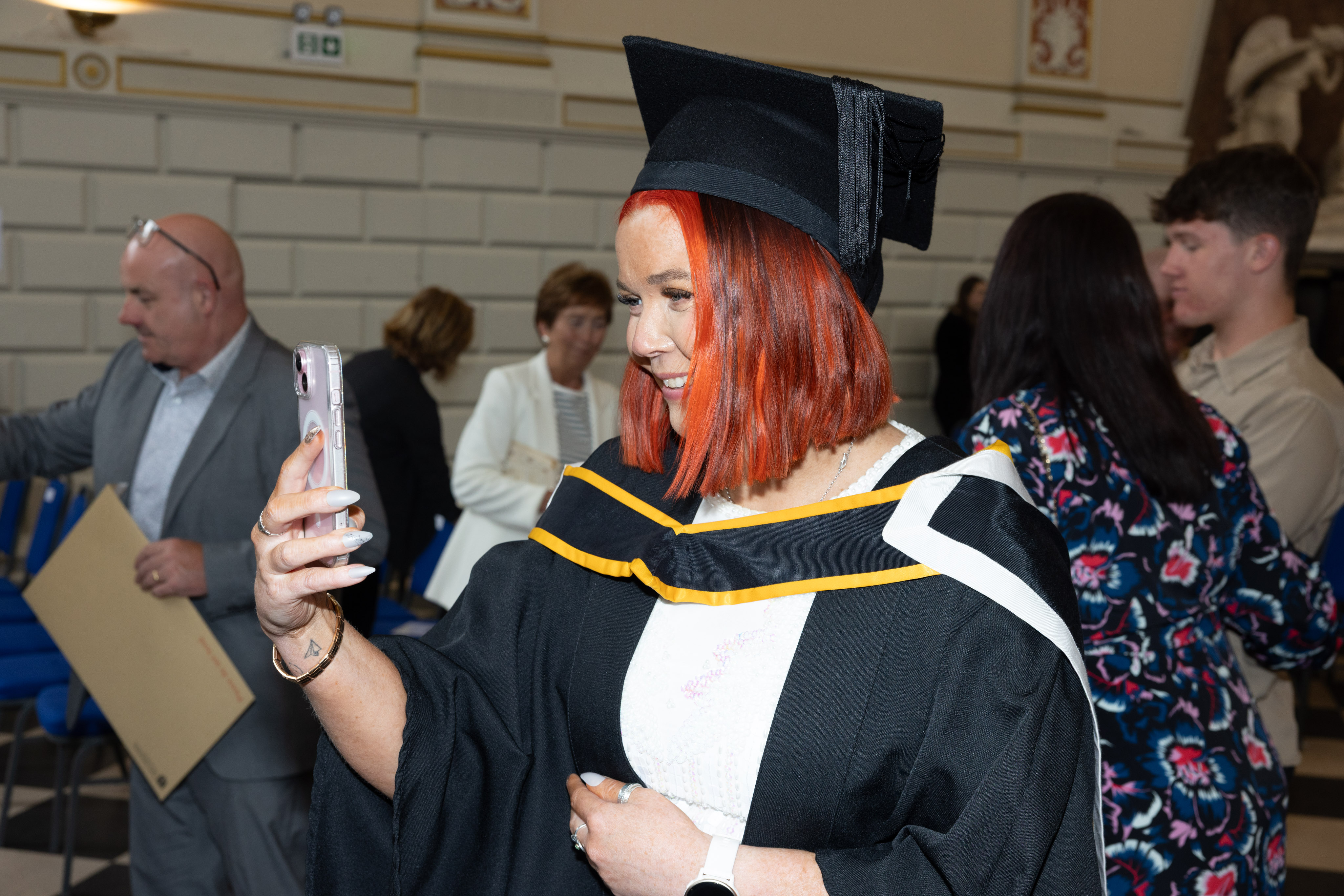
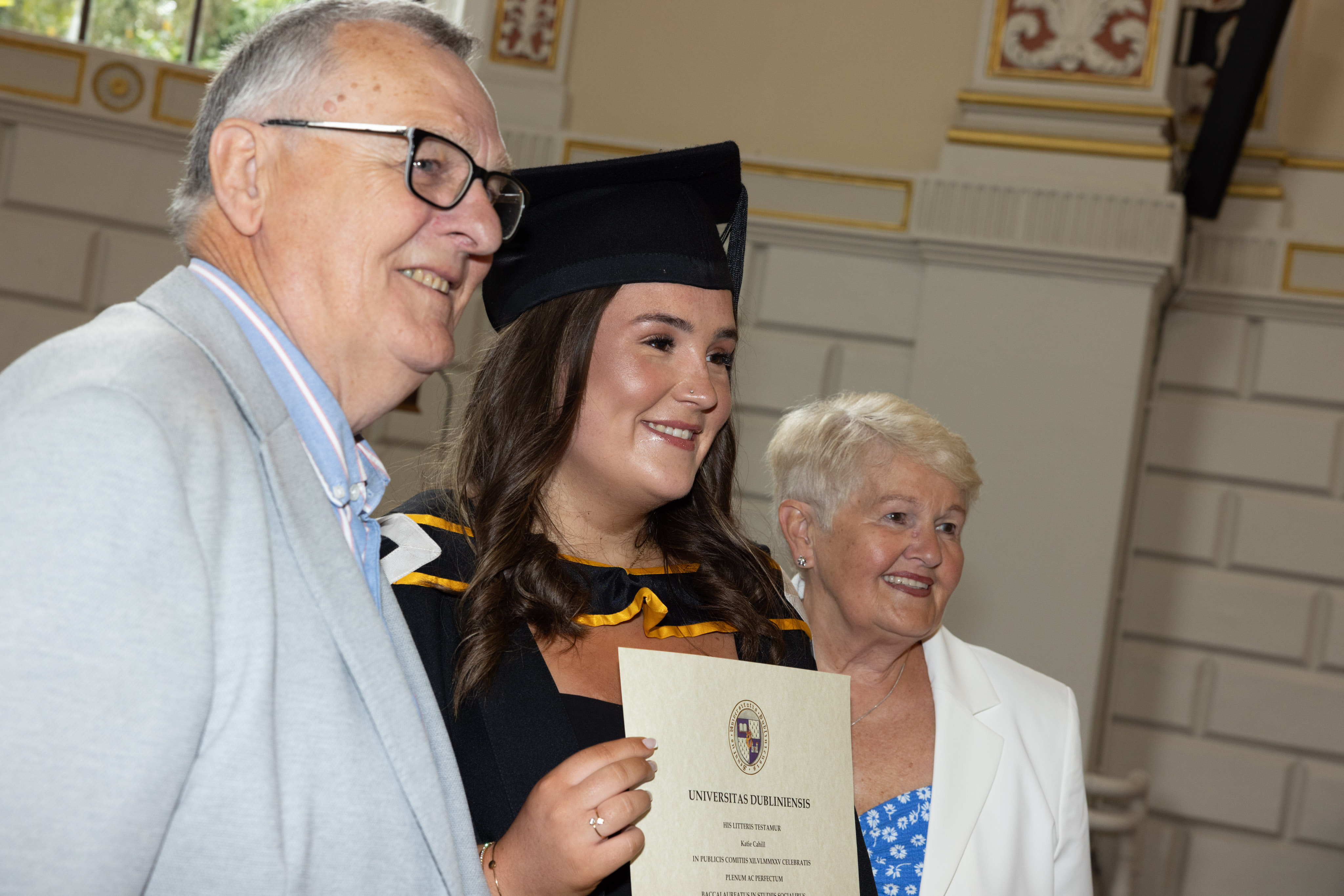
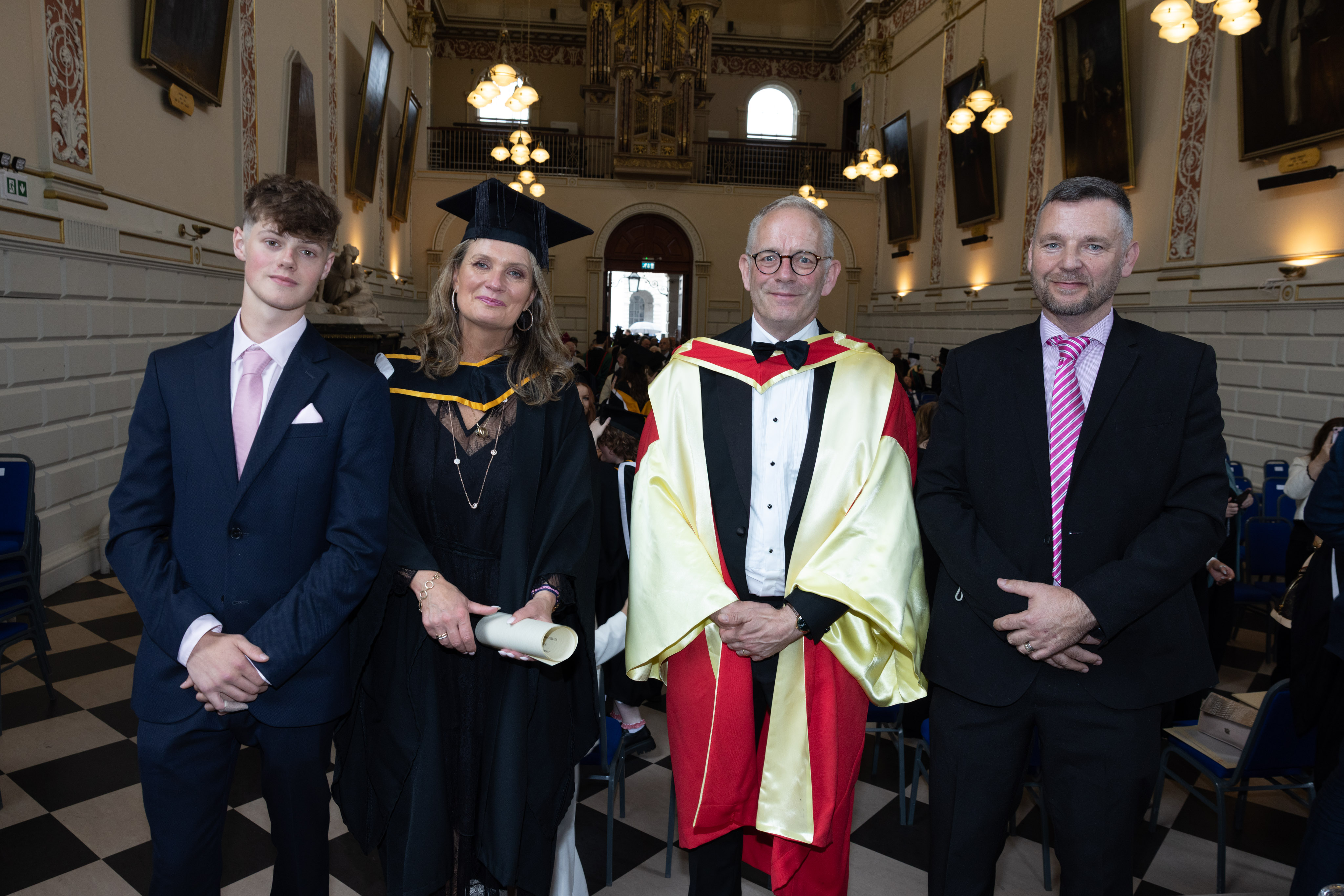
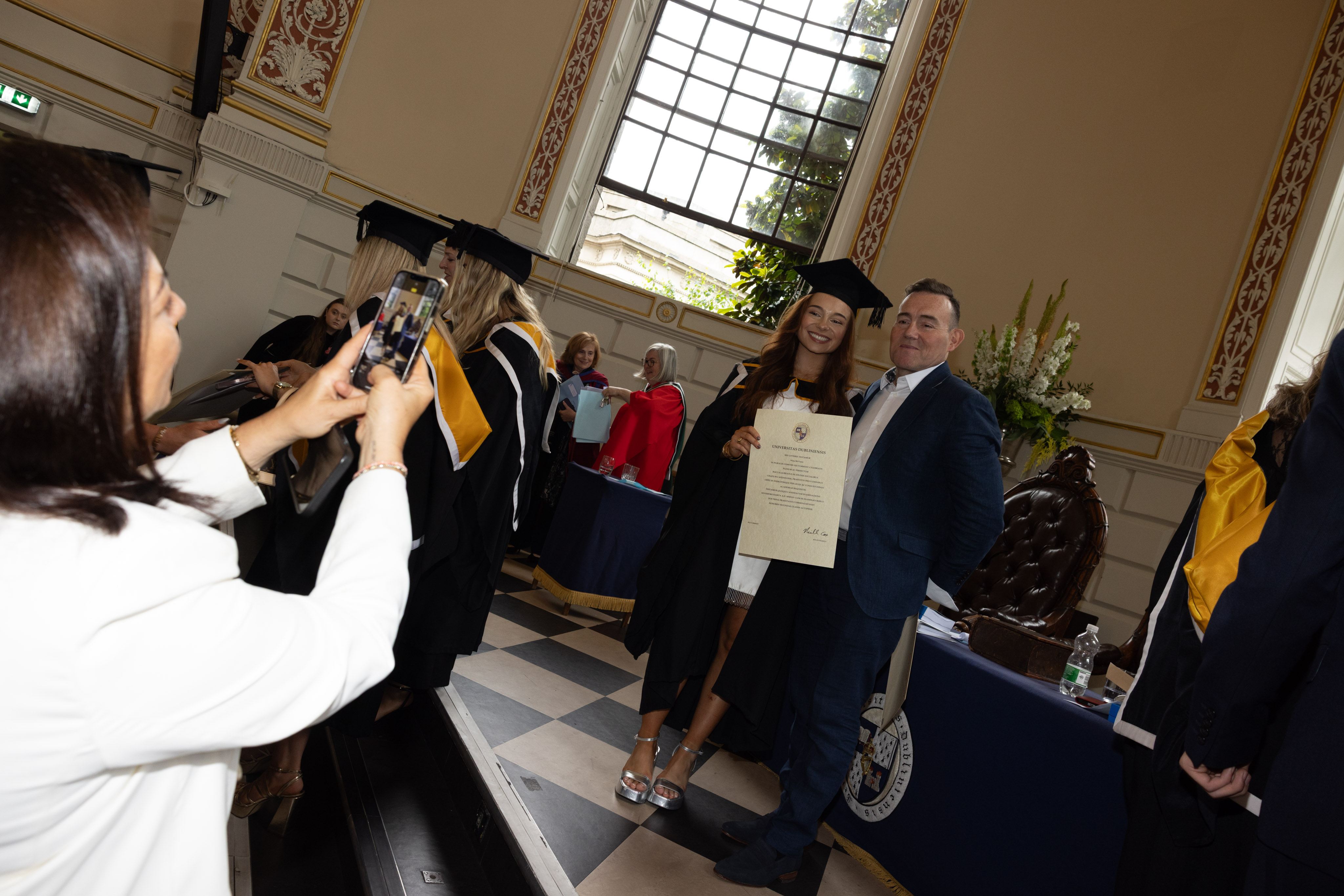
PhD Graduate Dr. Rong Bao & supervisors Prof Robbie Gilligan & Dr Catherine Conlon have a new co-authored publication in the Journal of Ethnic & Migration Studies
The study, titled "Being a rural mother in the urban space: understanding young rural migrant mothers' agency in cultivating an urban child in Beijing," has been published online in the Journal of Ethnic and Migration Studies on June 5, 2025. Dr. Bao completed her doctoral studies in the School of Social Work and Social Policy under the supervision of Professor Robbie Gilligan and Dr. Catherine Conlon. The research was conducted as part of her PhD programme. It focuses specifically on young rural mothers who migrate to Beijing and examines how they exercise agency in creating urban opportunities for their children, despite facing substantial structural barriers. The full article can be found here
June 11, 2025
PhD Researcher Kathryn Ammon and Dr. Catherine Conlon have a new co-authored publication out this week as part of the 'After Review' special issue of the Irish Journal of Sociology
It is available online now, open access.
Link to article: Access here
Citation:
Ammon, K., & Conlon, C. (2025). From choice to labour: Understanding ‘aborting labour’ in Irish at-home early medication abortion experiences. Irish Journal of Sociology. https://doi.org/10.1177/07916035251342139
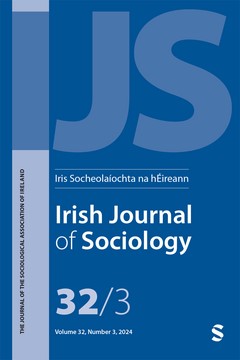
June 5, 2025
Dr Stephanie Holt is the lead author on groundbreaking study providing a comprehensive 360-degree understanding of the journey through the Irish family law system
The Irish family law system causes ‘secondary victimisation’ new research has found. The report authored by social scientists from School of Social Work and Social Policy, Trinity College Dublin and legal experts from the School of Law UCC documents how adult and child victim-survivors of domestic abuse are being retraumatised during guardianship, custody and access proceedings. Stephanie Holt, lead author of the report, explained: “This groundbreaking study provides a comprehensive 360-degree understanding of the journey through the Irish family law system and shows that the current operation of family law system for victim-survivors is serving to increase risk, undermine rights and compromise safety. It provides evidence and insights into a fundamentally flawed family law system when dealing with adult and child victim-survivors of domestic abuse including coercive control.
Congratulations to Stephanie and the full team of researchers involved
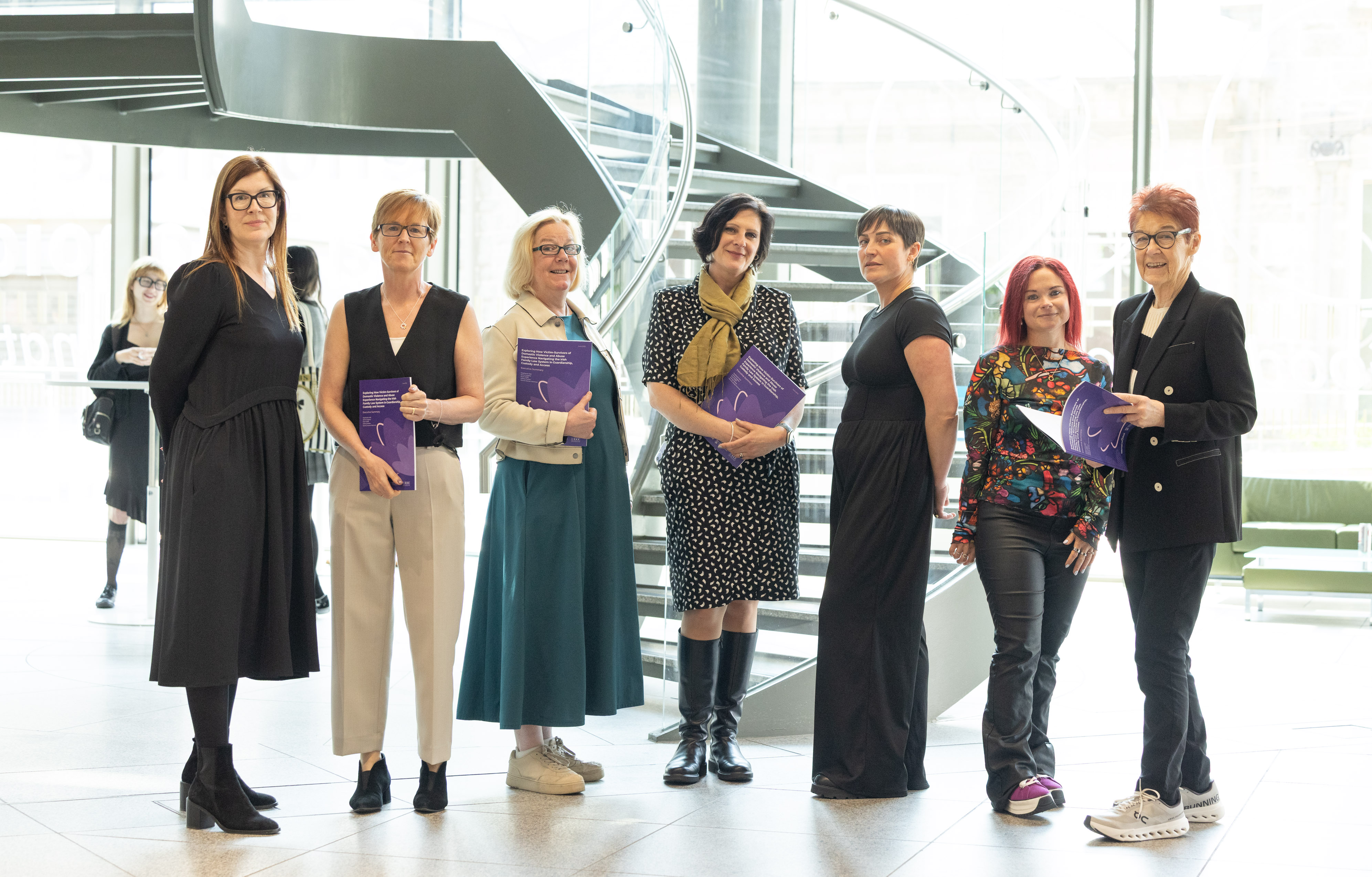
Dr Ruth Elliffe, Professor Stephanie Holt, Davina James-Hanman, Sarah Benson, Soma Gregory, Dr Aisling Parkes and Ailbhe Smyth
Further details can be found here
June 5, 2025
Professor Robbie Gilligan completes series of presentations on Care Leaver Policy in Melbourne, Australia
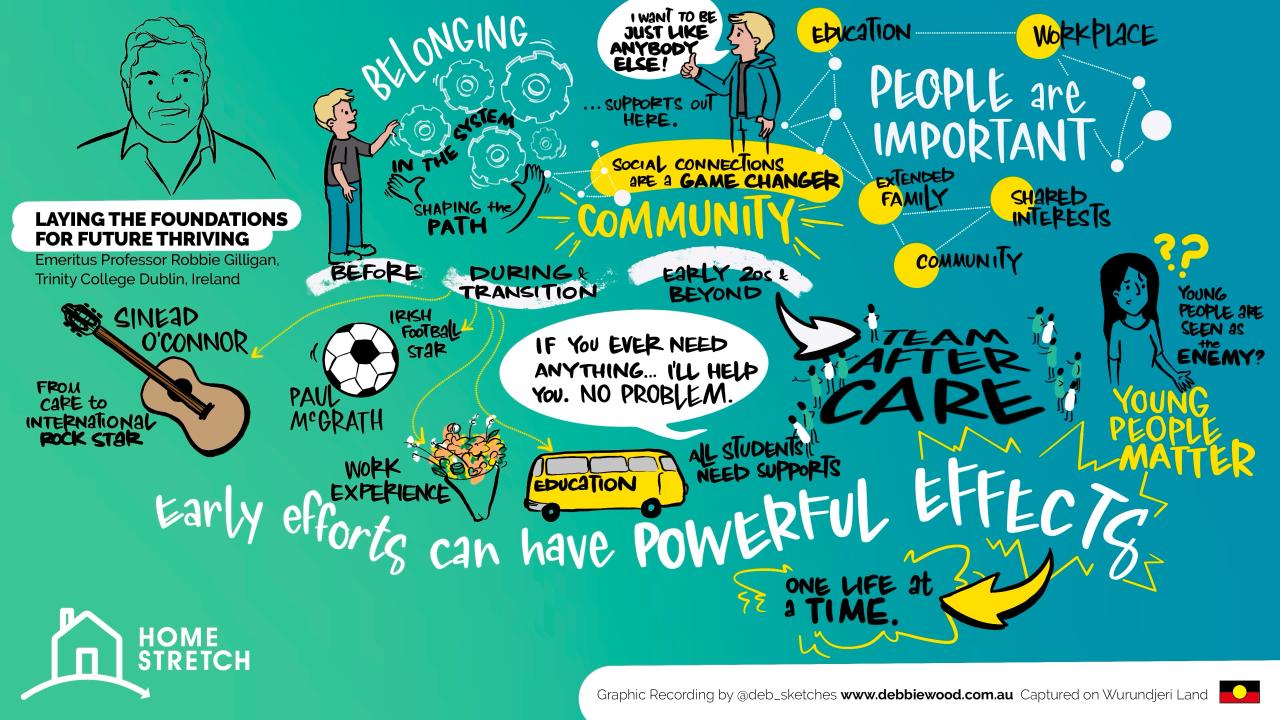
Professor Gilligan recently delivered the Opening Keynote at the fifth national Home Stretch Symposium in Melbourne. The Home Stretch campaign has been successful in stimulating and monitoring developments in relation to after care support for care leavers beyond the age of 18 across Australia.
The Home Stretch Symposium is a biennial event engaging with the nine jurisdictions that make up the states, territories and commonwealth of Australia. In his presentation, Prof Gilligan emphasised the importance of both practical and relational support and social connections for care leavers, and also the foundational work that can be done for care leavers through good quality care before the age of 18. The attached photo illustrates a visualisation of Prof Gilligan's keynote presentation to the Symposium by Debbie Wood.
Robbie also gave related presentations at the Department of Social Work, Monash University, the Department of Families, Fairness & Housing of the State of Victoria, and the Centre for Excellence in Child & Family Welfare.
May 29, 2025
School PhD students win awards at 2nd All Ireland Social Work Research Conference!

Rose and Vitalis were awarded the ‘AISWR Research Methodology Award’ for their presentation entitled Data collection in disability research: Key reflections from research conducted in Ireland and Zimbabwe
Sarah received the ‘Highly Commended’ award in the ‘AISWR Award for Breaking Boundaries in Social Work Research category’ for her presentation entitled Cancer identity experiences in head and neck cancer patients.
School PhD students and Master in Social Work graduates presented and volunteered at the conference along with School staff! The conference was the result of collaboration between the 10 schools of social work on the island of Ireland and the two Professional Social Work Associations. The conference was co-organised by Dr Eavan Brady (TCD), Kerry Cuskelly (Exchange House Ireland), Dr Sarah Donnelly (UCD), and Dr Niamh Flanagan (MU). More details available here: https://aiswrconf.wordpress.com/
May 29, 2025
Publication of new research report on the operation of the In Camera rule in family law proceedings
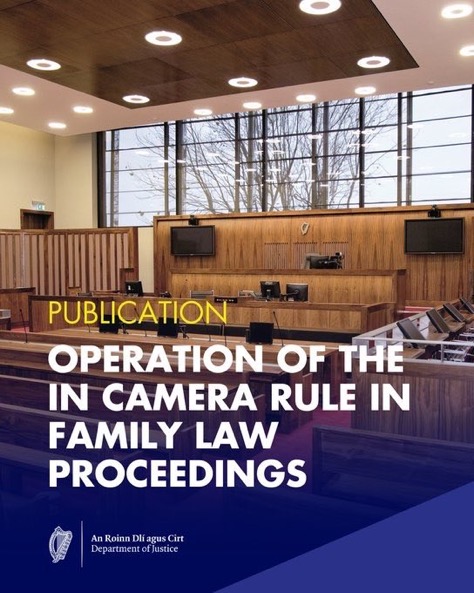 A new research report reviewing the operation of the In Camera rule in family law proceedings has been published. The review, a key action in the Family Justice Strategy, was conducted by a team from Trinity College Dublin (Dr Simone McCaughren) and UCC (Dr Aisling Parkes & Dr Kenneth Burns).
A new research report reviewing the operation of the In Camera rule in family law proceedings has been published. The review, a key action in the Family Justice Strategy, was conducted by a team from Trinity College Dublin (Dr Simone McCaughren) and UCC (Dr Aisling Parkes & Dr Kenneth Burns).
Read more here
Link to report
May 27, 2025
Congratulations to ASR Graduate Eva Boehle who had an article published in the International Journal of Bullying Prevention
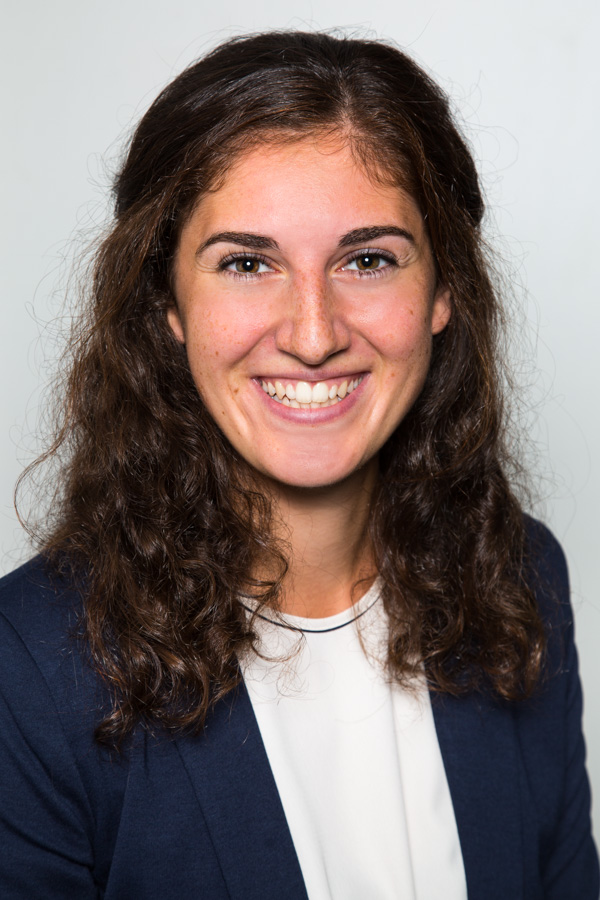
ASR graduate Eva Boehle has just published an article based on her Masters dissertation in the International Journal of Bullying Prevention. The article uses GUI data to examine continuities in bullying experience in the transition to adulthood and can be accessed here:
https://link.springer.com/article/10.1007/s42380-025-00302-8
May 20, 2025
We are Hiring! Assistant Professor in Social Policy - Specific Purpose Contract
We are seeking to hire an Assistant Professor in Social Policy - Specific Purpose Contract. If you would like to apply you will find the job spec and details of how to apply here
May 15, 2025
Congratulations to Dr Catherine Elliot O'Dare and Dr Joe Whelan who were awarded Research Ireland 'New Foundation's' Funding
Huge Congratulations to Dr Catherine Elliot O'Dare and Dr Joe Whelan who were awarded Research Ireland 'New Foundation's' Funding
Here are short summaries from Research Ireland on each of the projects
1. Dr Joe Whelan - ‘The flats are coming down. Yup the flats! “A sociological exploration of life in the Dolphin House flat complex using arts-based creative method
Dolphin House and Park is a strong, neighbourly and proud community in Dublin’s South Inner City. Built in 1957, the complex is made up of 392 flats in 6 blocks. It remains Dublin's largest public housing flat complex while also remaining one of Dublin’s most deprived areas. Generations of families live there and now, through the slow process of regeneration, people are being ‘de- tenanted’, and the flats are coming down. While Dolphin House yet remains standing, this project will seek to understand how regeneration is being experienced and to document life in the flats using arts based creative techniques.
2. Dr Catherine Elliot O'Dare - Understanding self- directed ageism:. A qualitative study with older people in Ireland.
Self-directed ageism, whereby older people internalise negative stereotyping, viewing themselves through a negative and ageist lens is particularly harmful form of ageism, leading to a shorter lifespan, life limiting behaviours, poor health, and social isolation (Age Action, 2022: Ishikawa, 2023). Qualitative interviews with older people aged 50 and over in Ireland will provide valuable empirical insights into how older people understand, and experience self-directed ageism. Research findings will promote a wider understanding of self-directed ageism, and will be of interest to advocacy organisations, policy makers and older persons themselves, as they work to tackle and eliminate ageism in contemporary society.
Details of all TCD recipients can be found here
May 8, 2025
Congratulations to Blaithín O’Brien, a Trinity Sociology and Social Policy graduate (2023), who has published an article in the Irish Journal of Sociology
Congratulations to Blaithín O’Brien, a Trinity Sociology and Social Policy graduate (2023), who has published the article “Periods, technology and identity: The experience of period-tracking app users” in the Irish Journal of Sociology. The article is based on Blaithín’s final year Sociology and Social Policy dissertation, which explored the experiences of Irish users of period tracking apps. Blaithín was supervised by Dr. Edurne García Iriarte. The article is available to read here
May 8, 2025
Social Policy Careers Night - 28th April 2025

We were delighted to welcome back members of our Social Policy alumni community to share their career pathways after graduation with this years’ third and fourth year Social Policy students. Students found the testimonies of winding and diverse pathways and destinations surprising and inspiring with key messages emphasising letting your values guide you, the high level of transferability of skills a social policy graduate has and the presence of policy roles in all sectors – public, voluntary and private.
The generosity and continued goodwill of our Alumni to our School was a pleasure to witness and students and alumni happily networked and chatted together for the rest of the evening in the Pav. We look forward to many more networking events and to having the class of 2025 return to us to share their pathways in the future.
Thanks to all of our wonderful Alumni below and in the picture for contributing to this event:
Mairead Finn 2005 and went on to study a Masters in Economic Science, European and Economic Affairs from UCD and PhD in Social Policy from Trinity. Mairead currently works for the Department of Foreign Affairs, Ireland and based in Brussels as a Permanent Representation of Ireland to the EU/Attaché in area of Police Cooperation, Justice and Home Affairs.
Robert Kiernan 2016 and went on to study a Master’s in Public Policy in UCD as well as qualifications in project management, financial regulation, and public relations. Robert has worked in the public policy sector for a little under eight years, and is currently the Director of the Irish Beverage Council at IBEC.
Josephine Greene 2019 and went on to study a Master’s in Applied Social Research in the School of Social Work and Social Policy, Trinity College Dublin. Jo is currently a 3rd year HRB funded research scholar on the SPHeRE programme, Ireland’s national PhD research training programme for population health, policy and health services research attached to Maynooth.
Laura Bambrick 2004 went on to study a Masters in Comparative Social Policy and a DPhil at Oxford University. Laura is currently Senior Policy Officer at Irish Congress of Trade Unions.
Eoin Carroll 2004 went on to study an MSc. Social Policy at LSE, MBS Business at UCC as well as Dip. Corporate Governance, and Dip. Community Development. Eoin is currently Director of Corporate Services in Cooperative Housing Ireland
Fiachra McCabe 2005 went on to study a Masters in Social Work in UCD. Fiachra currently works as a Senior Social Worker in Mental Health at Tallaght Hospital.
Niall Costello 2019 went on to study an MSc in Applied Social Research. Niall is currently a PhD Candidate and IRC Scholar with The School of Psychology, UCD.
April 30, 2025
Congratulations to Dr Simone McCaughren who presented her report entitled 'the operation of the in camera rule in irish family law' to the Minister for Justice
The Minister for Justice attended a report launch with Dr Simone McCaughren and her colleagues Dr Aisling Parkes and Dr Kenneth Burns UCC. They presented findings from their report into The Operation of the In Camera Rule in Irish Family Law at the Family Justice Forum event in the Department of Justice. The full report will be published very shortly.
Coverage of the event can be viewed here:
April 29, 2025
Congratulations to our M.Sc. in Applied Social Research class of 2024 who graduated today.
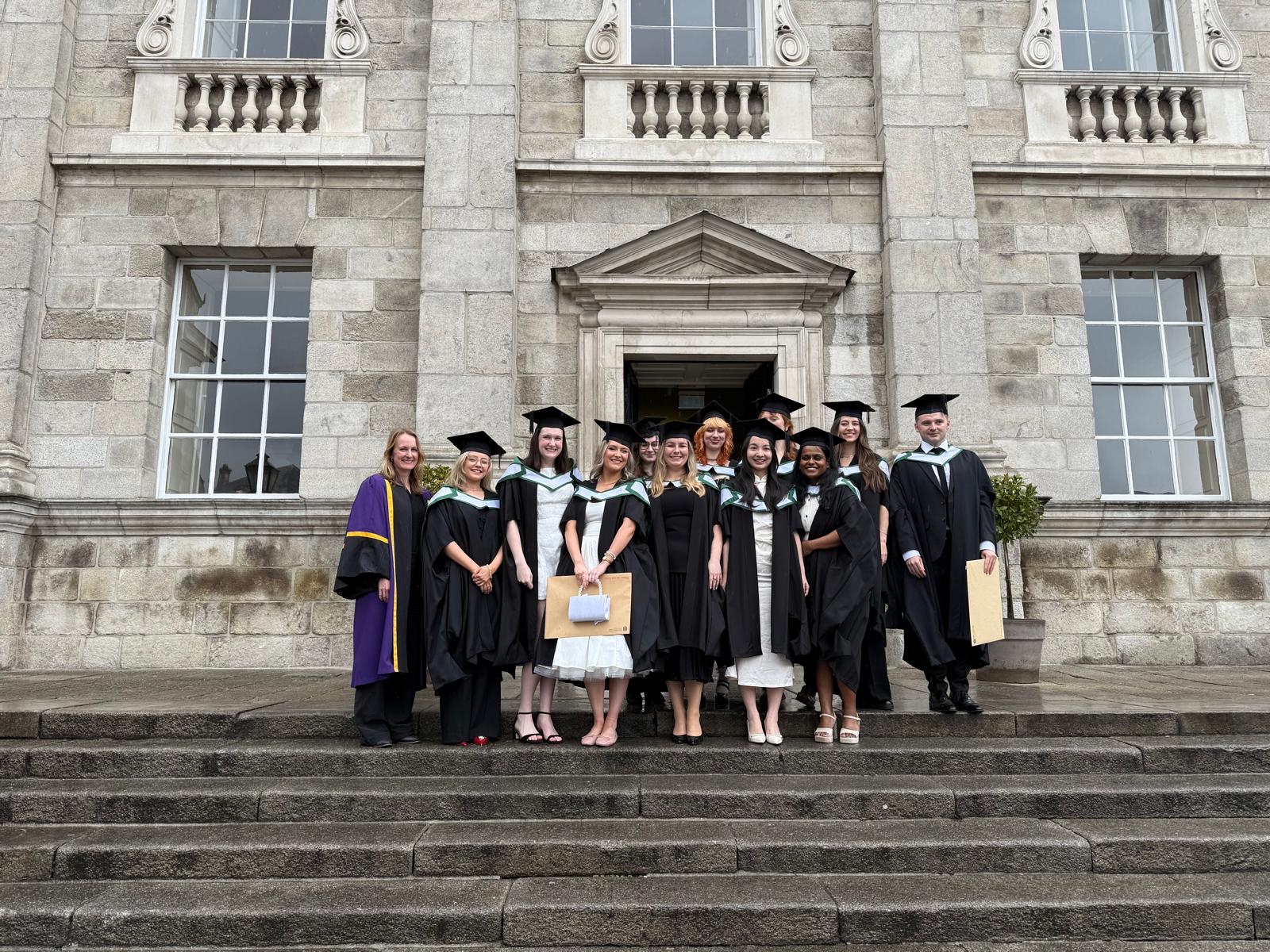
Warm congratulations to everyone who graduated today. We hope you have a wonderful day celebrating your success and we wish you the very best for the future.
April 16, 2025
Professor Emeritus Robbie Gilligan recently made a presentation on 'Leaving Care - What Next?
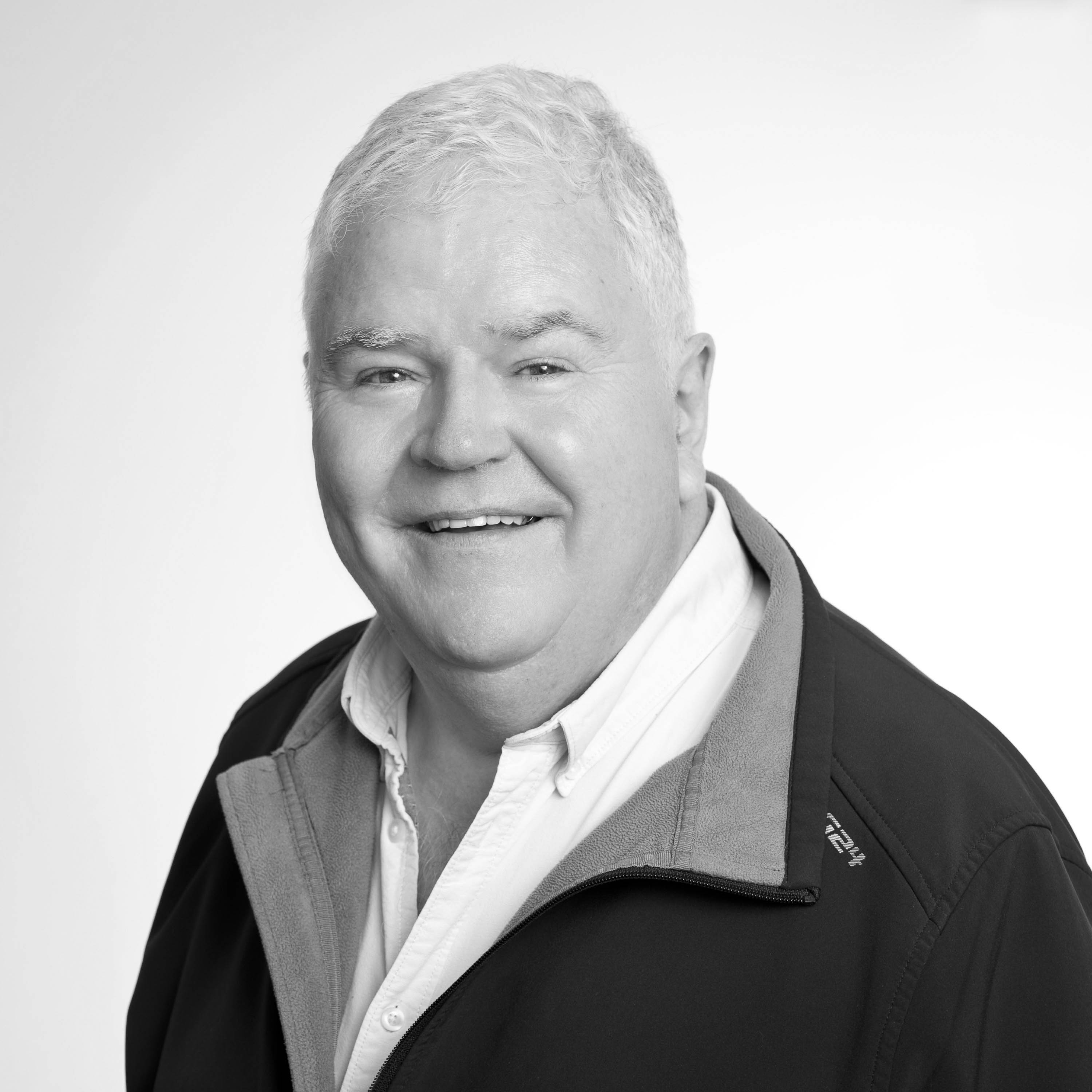
Professor Emeritus Robbie Gilligan recently made a presentation on 'Leaving Care - What Next?' at the European Parliament. He was an invited presenter to the joint hearing of the Committee on Legal Affairs and the Committee on Employment and Social Affairs of the European Parliament. This joint hearing which was entitled the “Protection and promotion of the rights of children placed in alternative care” was held on March 18th. A video clip of the presentation is available at the following link: https://shorturl.at/48QeT
April 07, 2025
The misconstrued woman: A research and documentary film launch

On Wednesday 26th of March, The School of Social Work and Social Policy was proud to host the launch of The Misconstrued Woman, a research project conducted by Laidlaw Scholar and BSS student, Frøya Mostue-Thomas under the supervision of Dr Joe Whelan. The launch event included a display of the collages made by research participants, an overview of the research and the premier of a documentary film that viscerally explores lived experiences of women's homelessness.
The event was huge success with a packed Robert Emmett Theatre giving a standing ovation to Frøya as film director. After a Q&A session, the event was closed with some thought-provoking words from Head of the School of Social Work and Social Policy, Dr Catherine Conlon.
April 01, 2025
Marian Lynch Medal Winners
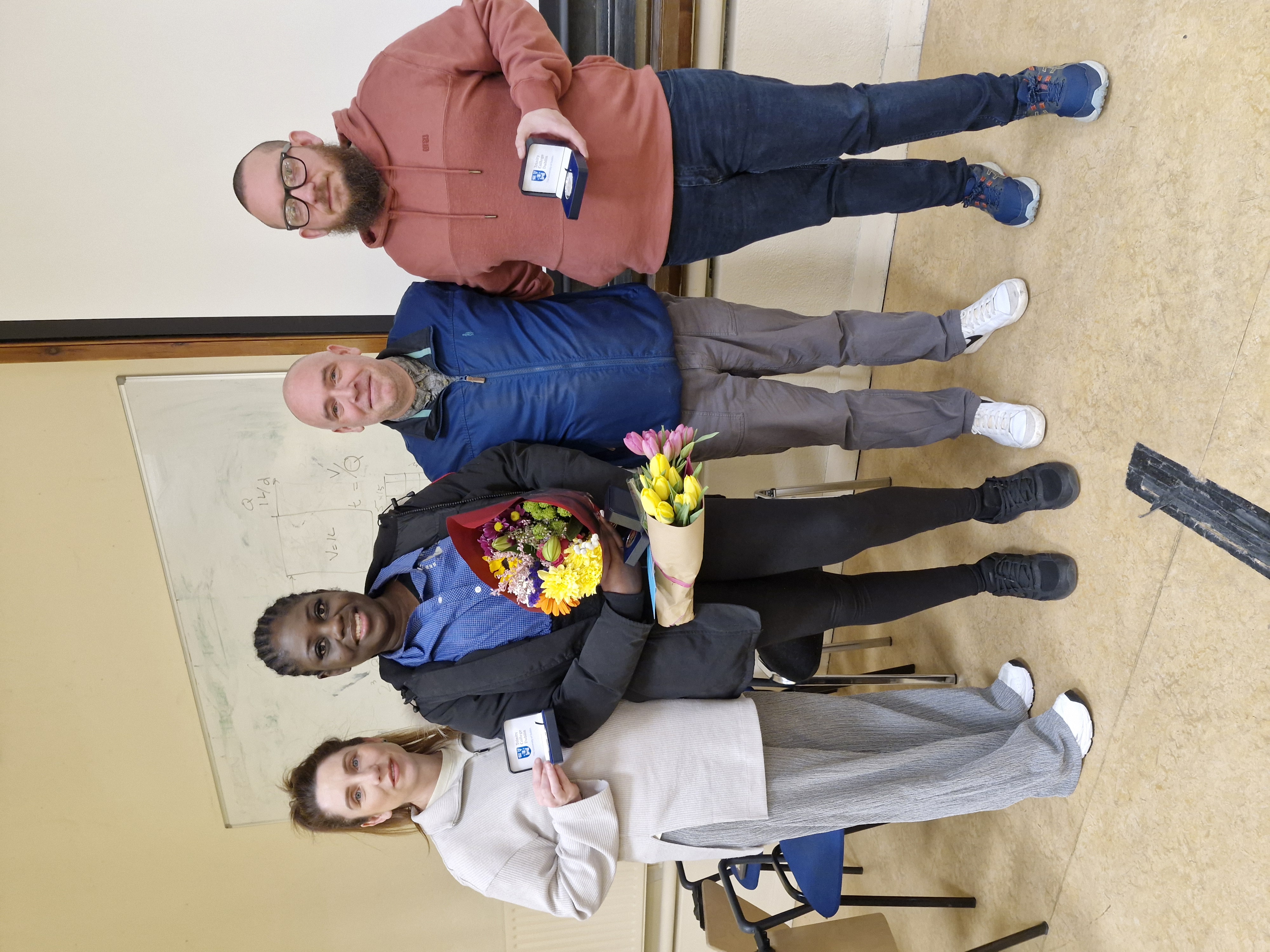
Congratulations to our most recent Marian Lynch medal winners who were presented with their medals by course director, Joe Whelan.
This award was commissioned in 2006 by classmates of Marian Lynch, a Junior Sophister BSS student who died in May of that year. Marian greatly enjoyed her course, in particular the Community Work module which reflected her deep affection for and commitment to her own community, the Liberties. Each year, the medal is awarded to each member of the group who achieve the highest mark in the Senior Fresh Community Work project .
Pictured left to right; Lynsey Boylan , Adefunke Agbabiaka, Joe Whelan (Course Director) and James Carey.
Well done!
March 27, 2025
First-year PhD Student Danielle Young awarded a grant from the European Society of Contraception and Reproductive Health
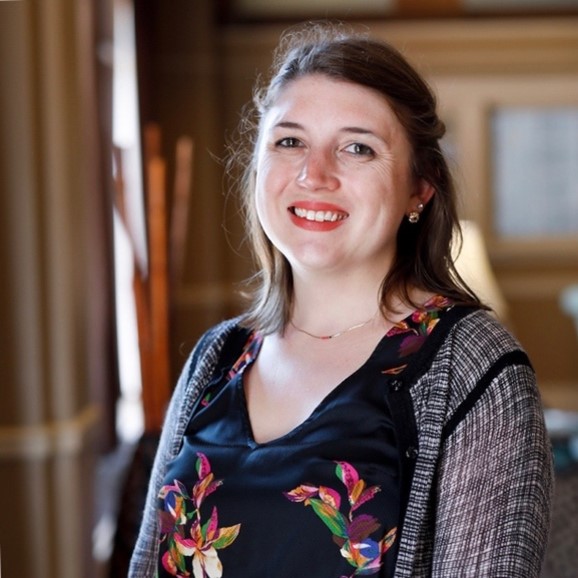
First-year PhD Student Danielle Young, supervised by Dr. Louise Caffrey and Dr. Catherine Conlon, has been awarded a grant from the European Society of Contraception and Reproductive Health. This grant will be used to develop a data collection infrastructure for GP administered early medical abortion in Ireland. This work is part of ongoing work of Catherine Conlon in partnership with the Southern Task-Force on Abortion a Reproductive Topics (START), a GP-led group of abortion providers in Ireland, to improve and monitor abortion service delivery.
March 25, 2025
Lived Experiences of Foster Care:Messages from Research for Practice
Join us for the next TRiCC seminar online (Zoom) on Monday 28th April at 1pm. Chaired by Dr Yekaterina Chzhen and presented by Sinéad Tobin and Dr Sinéad Whiting, the seminar will focus on children’s lived experience of foster care.
Register here: https://tcd-ie.zoom.us/webinar/register/WN_G247js9ITSSx41PUDpR2dQ
Sinéad Tobin’s presentation will draw on findings from two research projects relating to foster care placement breakdown. In contrast to the dominant quantitative knowledge base on this topic, Sinéad’s presentation will focus on children and young people’s lived experiences of placement breakdown. The presentation will conclude with offering key messages for practice.
Dr. Sinéad Whiting’s presentation will explore findings from a qualitative study involving 22 young adults who grew up in foster care with permanence in Ireland. The presentation will focus on the participants' descriptions of their relationships with their foster carers and the various ways they developed a sense of permanence throughout their time in long-term foster care. It will highlight the co-creation of permanence between the young adults and their foster carers, offering insights into the dynamics that contributed to their sense of stability and belonging.
March 24, 2025
14th European Conference for Social Work Research (ECSWR)
 Associate Professor Susan Flynn, Assistant Professors Erna O'Connor, Sinéad Whiting and Sinéad Tobin and Kevin Ryan, Senior Social Work Practitioner, St James’ Hospital, Dublin and external contributor to the BSS and MSW programmes, participated in the 14th European Conference for Social Work Research (ECSWR) which took place from 12-14 March 2025, at the Katholische Stiftungshochschule, Munich, Germany. The ECSWR is the biggest annual social work research event in Europe. This year's conference theme was "Embracing Democracy in Social Work Practice and Research"
Associate Professor Susan Flynn, Assistant Professors Erna O'Connor, Sinéad Whiting and Sinéad Tobin and Kevin Ryan, Senior Social Work Practitioner, St James’ Hospital, Dublin and external contributor to the BSS and MSW programmes, participated in the 14th European Conference for Social Work Research (ECSWR) which took place from 12-14 March 2025, at the Katholische Stiftungshochschule, Munich, Germany. The ECSWR is the biggest annual social work research event in Europe. This year's conference theme was "Embracing Democracy in Social Work Practice and Research"
Presentations from the School of SWSP were as follows:
A policy content analysis of 'Children First: National Guidance for the Protection and Welfare of Children' (2017) examining the utility and relevance of Children First for disabled children.
Dr Susan Flynn, School of Social Work & Social Policy, Trinity College, Dublin.
Mr Haocheng Shi, School of Social Work & Social Policy, Trinity College, Dublin.
Experiences of a tutor-led, pilot placement programme in a healthcare context, through a Communities of Practice lens.
Dr Erna O’Connor & Dr Sinead Whiting, School of Social Work & Social Policy, Trinity College, Dublin.
Ms Paula Markey & Mr Kevin Ryan, Social Work Service, St James’ Hospital, Dublin.
Ms Jo Greene, PhD Research Scholar, the SPHeRE Programme
Permanence Display : Evidence of the co-creation of permanence in long-term foster care
Dr Sinéad Whiting, School of Social Work & Social Policy, Trinity College, Dublin.
Opening the Doors: a practitioner in academia and an academic in practice
Ms Sinead Tobin, School of Social Work and Social Policy, Trinity College Dublin & Principal Social Worker, Office of Chief Social Worker, Tusla Child and Family Agency.
March 24, 2025
Congratulations to SWSP PhD students
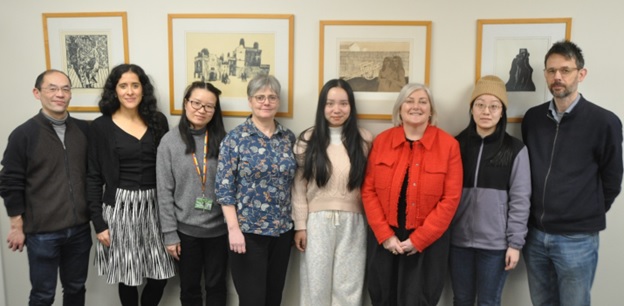
Congratulations to SWSP PhD students, Wenyu Li and Jianing Zhu who presented on their research at the I-ARoA (Ireland's Network on Research on Ageing in Asia) seminar on 14 February 2025 at the UCD Geary Institute for Public Policy. Both presentations were very well received by the attendees from across multiple academic disciplines and NGO’s. Ireland's Network of Research on Ageing in Asia (I-ARoA) was founded in 2023 by Dr Catherine Elliott O’Dare, School of Social Work and Social Policy TCD and Dr Naonori Kodate, School of Social Policy, Social Work and Social Justice, UCD. The aims of I-ARoA are to connect PhD scholars in Ireland researching ageing in Asia and their supervisors, provide a supportive and collaborative network for members, and provide opportunities for members to share expertise, knowledge, and experience. It achieves these aims through regular network meetings and organising research-focused events. TCD, UCD and Maynooth University comprise current membership. New members are welcome, please contact Catherine at elliot@tcd.ie if you are interested in joining the network.
March 21, 2025
Prosperity without Growth - Public Lecture and Discussion

The School of Social Work & Social Policy is delighted to host Professor Mario Pansera who will deliver a public lecture entitled Prosperity with Growth. This is a free event and full details and tickets can be found here
March 19, 2025
Sherie de Burgh commemorative seminar jointly hosted by One Family and the School of Social Work and Social Policy
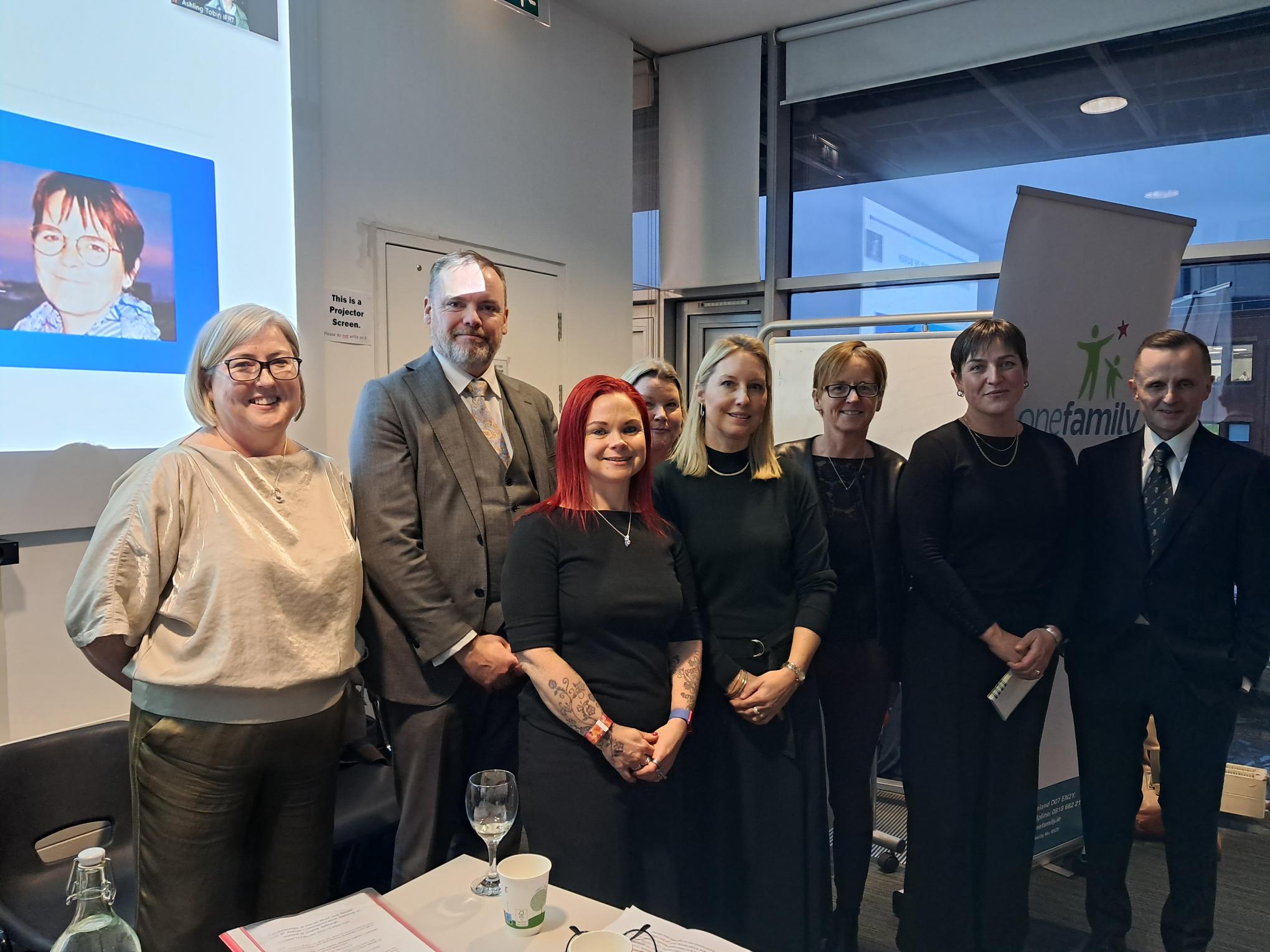
The theme for this year’s Sherie de Burgh commemorative seminar jointly hosted by One Family and the School of Social Work and Social Policy in Trinity College Dublin was ‘Contact with Children Following Separation: Practice to Policy NGO–TCD Research Collaborations’.
Dr Simone McCaughren led the One Family commissioned research project which formed the focus for this year's commemoration lecture. This research resulted in the publication of an interdisciplinary report and Guidance on Contact Time for Infants and Young Children in Separated Families. Together with Professor Stephanie Holt, Dr Aisling Parkes (School of Law, UCC) and Soma Gregory (Research Assistant), this ground-breaking piece of work provided a cross disciplinary perspective spanning social work/policy, law and psychology of the considerations for very young children in family law proceedings in Ireland. This ambitious research study was empirical in nature and engaged with various dimensions of the legal system, which has been untouched by research to date.
Chaired by the Head of School, Dr Catherine Conlon, speakers included: Dr Simone McCaughren (Principal Investigator of Research Report: Contact time for infants and young children in separated families); Geraldine Kelly, One Family’s Director of Parenting and Professional Development Services; Andrew Munro – Head of Policy and Legislation for Civil Justice, Assistant Secretary General in the Department of Justice overseeing the development of the Family Justice Reform; His Honour Judge Geoffrey Shannon – Former Law Society director and current Circuit Court judge, Dr Shannon was Special Rapporteur on Child Protection for the Irish Government 2006-19 and is the author independent report into historical child sex-abuse allegations in St John Ambulance 2023. The full research team joined a panel discussion chaired by Prof Stephanie Holt and the event was closed by Karen Kiernan, CEO of One Family.
Sherie was a person of infinite compassion particular for anyone encountering bumps in life’s path which remains the core of One Family’s work who are at the coalface of practice working with children and families navigating very complex systems, and oftentimes experiencing social injustice. One Family understand that knowledge production is a shared endeavour, and that building knowledge is not just a one-way flow, it is a collaborative iterative process and is intended to build new knowledge for the purpose of taking social action. Most importantly, One Family, respect the voices of those with lived experiences and see them as an essential and fundamental part of the research process – where experiences are recognised and valued.
And so this research grew from the ground up. It attempted to gain a bird’s eye view of how and in what ways, contact arrangements for infants and young children in the 0-6 years are navigated where parents are parenting separately. In addition, it sought to understand how those arrangement are managed and how the perspectives of this young children can be listened to. The School of Social Work and Social Policy at TCD who collaborate with One Family commemorating Sherie annually were delighted this year to showcase a research partnership between the School and One Family. The large attendance and deep interest on the evening, combined with the policy and justice imperative of progressing this issue demonstrated by Andrew Monro talking from a Department of Justice perspective and Judge Geoffrey Shannon, talking from a judicial perspective highlighted to us the value of forums to discuss and debate this topic and we expect to come back to it in our Schools seminar series again soon. Watch this space!
March 4, 2025
Sixth Annual Sherie de Burgh Commemorative Event

The theme for this year’s event is: Contact with Children Following Separation: Practice to Policy NGO–TCD Research Collaborations.
The sixth annual Sherie de Burgh commemorative seminar jointly hosted by One Family and the School of Social Work and Social Policy in Trinity College Dublin will explore the experiences of one-parent families in Ireland and reflect on their joint research, which illustrates a practice-to-policy approach and can be accessed here:
Guidance on Contact Time for Infants and Young Children in Separated Families
Event Details
If you wish to attend this event in person on the day, please find the event details and registration form below.
Date: Thursday, 13 February 2025
Time: 5.30pm – 7pm
Programme
Registration will take place between 5pm – 5.30pm. Please come early to register your details and attendance in person only if have not pre-registered online using the form below.
Seminar: 5.30pm – 7pm
Reception: from 7pm
Location
Trinity Research in Social Sciences (TRiSS)
TRiSS Seminar Room
6th Floor, Sutherland Centre
Arts Building, Trinity College Dublin
Streaming link: on the day, the event will be available to watch on YouTube here .
Summer school opportunity to travel to Germany and learn about disability and child welfare!
Summer school opportunity to travel to Germany and learn about disability and child welfare! Limited spaces available, see here for more information and to apply by 1st of February.
Jan 16, 2025
Head of School and Associate Prof Catherine Conlon, together with Prof Virpi Timonen, University of Helsinki and Dr Geraldine Foley, School of Medicine, Trinity College have authored a new paper for the Qualitative Research Journal entitled 'Quality in qualitative research:a relational process
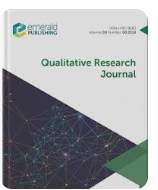 Head of School and Associate Prof Catherine Conlon, together with Prof Virpi Timonen, University of Helsinki and Dr Geraldine Foley, School of Medicine, Trinity College have a paper just out in Qualitative Research Journal entitled 'Quality in qualitative research: a relational process' available on Open Access here
Head of School and Associate Prof Catherine Conlon, together with Prof Virpi Timonen, University of Helsinki and Dr Geraldine Foley, School of Medicine, Trinity College have a paper just out in Qualitative Research Journal entitled 'Quality in qualitative research: a relational process' available on Open Access here
The paper argues that quality in qualitative research cannot be ensured with the help of checklists alone. We assert that quality in qualitative research is a set of relationships, threaded through the entire research process, between the researcher and the researched topic, participants, data, data analysis and audience. It sets out how the foundations of qualitative inquiry, across all paradigms, demand an engaged, committed researcher attending iteratively and with care – relationally – to every stage of the research process in pursuit of quality. The key novel contribution of this paper is its argument that adopting a relational ethic of commitment to quality at each stage of the research process is conducive towards high-quality qualitative research. The paper will be useful for established qualitative researchers, doctoral students, postgraduate and undergraduate students engaging in qualitative social research, in particular for its elaboration of parsimonious quality criteria specific to qualitative research.
Jan 14, 2025
Joe Whelan publishes a new textbook with Policy Press!
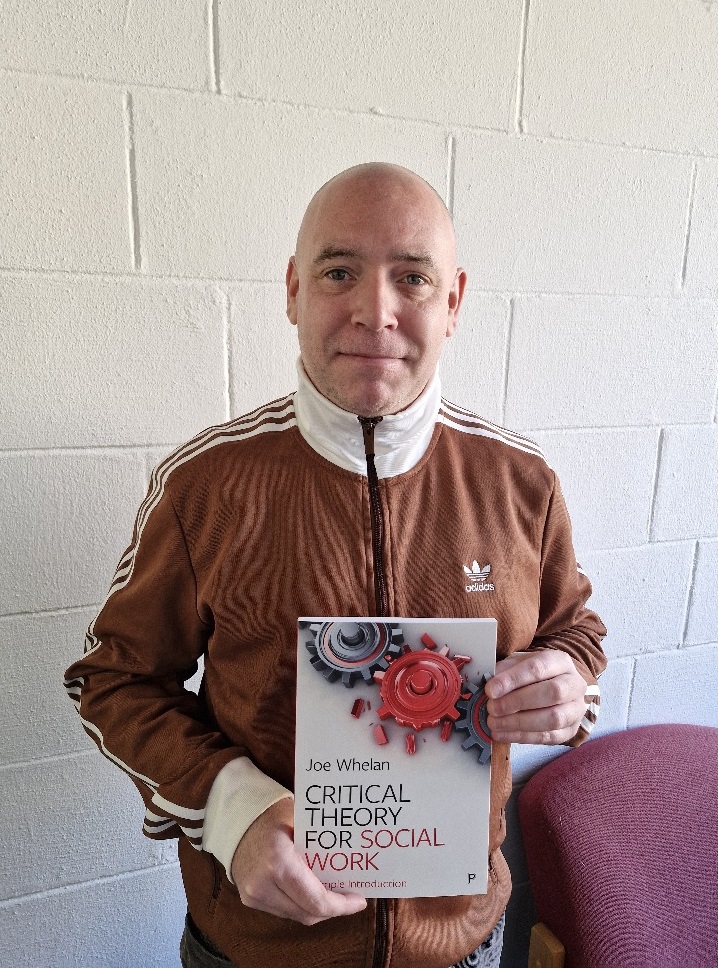
Joe Whelan's latest book 'Critical Theory for Social Work' is published and available. The books aims to introduce interested readers to Critical Theory in an accessible and interesting way. The companion website for the book is also live and includes a full lesson plan, a full and adaptable slide deck and a set of short explanatory video clips. The materials available on the companion website are designed for instructors to make the text easy to adopt as a core text for teaching social work students about critical social theory. The book and accompanying materials are designed to be accessible and to be used across jurisdictions, so please feel free to share widely and get in touch with Joe if you have any questions.
The book is published by Policy Press. To access materials and find out more about the book, see links below:
https://policy.bristoluniversitypress.co.uk/critical-theory-for-social-work
https://policy.bristoluniversitypress.co.uk/critical-theory-for-social-work/online-resources
https://www.youtube.com/playlist?list=PLP899GzKi9xV8JAUUrDqmCvHWlq89g3hD
Jan 8, 2025
Launch of Report on Sentencers’ Perspectives on Community Service Orders and Short Term Prison Sentences

A report on sentencers’ views of Community Service Orders (CSOs) and Short Term Prison Sentences co-written by Professor Nicola Carr, Chair of Social Work and Social Policy and Dr Niamh Maguire (SETU) was launched in the Department of Justice today (6th November). The report is based on research commissioned by the Department of Justice. The research explores the reasons for the continued use of sentences of short-term imprisonment, despite their known negative effects, and the relative under-use of community service orders in Ireland. The research, which includes a systematic review of literature and in-depth interviews with judges, finds that there are numerous barriers to the use of community service orders. The report makes a number of key policy recommendations including the need to review the current thresholds at which CSOs are set alongside their legislative status; reconsideration of suitability criteria for CSOs; increased resourcing and awareness raising and information sharing.
The report is available to download from the Department of Justice website here
Nov 7, 2024
Congratulations to School staff and colleagues on their publication ‘Children’s experiences of signs of safety: A scoping review
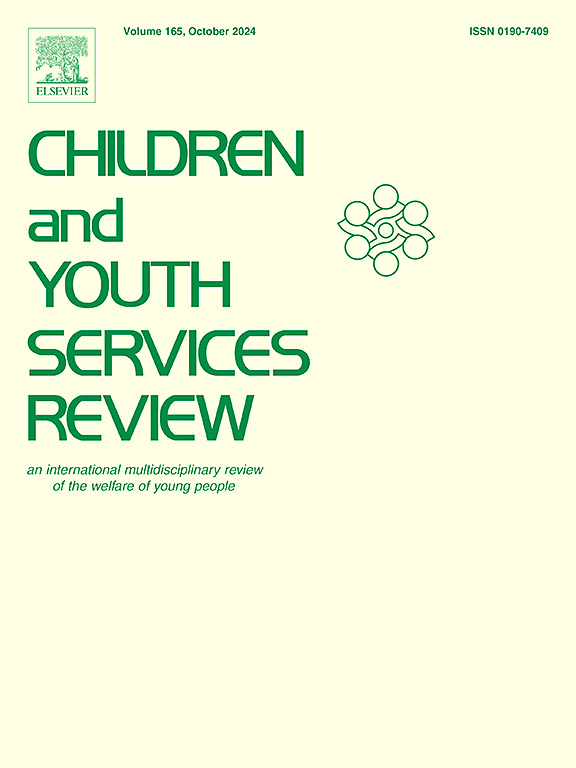 Congratulations to Dr Louise Caffrey, Dr Eavan Brady, Orla Keegan, Greg Sheaf, Siobhan Dunne, Prof Stephanie Holt, and Prof Emeritus Robbie Gilligan on their recent publication in Children and Youth Services Review. This scoping review identifies and synthesises the existing literature concerning children’s self-reported experiences of Signs of Safety and can be accessed for free until 24th December here.
Congratulations to Dr Louise Caffrey, Dr Eavan Brady, Orla Keegan, Greg Sheaf, Siobhan Dunne, Prof Stephanie Holt, and Prof Emeritus Robbie Gilligan on their recent publication in Children and Youth Services Review. This scoping review identifies and synthesises the existing literature concerning children’s self-reported experiences of Signs of Safety and can be accessed for free until 24th December here.
Nov 7, 2024
We are Hiring - Post Doctoral Researcher: Care Leavers - Ten Years On Project
We are delighted to announce we are hiring a Post Doctoral Research on the project Care Leavers - Ten Years On. Full details of the post and the application link can be found here
Oct 17, 2024
Professor Emeritus Robbie Gilligan contributes chapter on kinship care to major new publication on child and family social work research
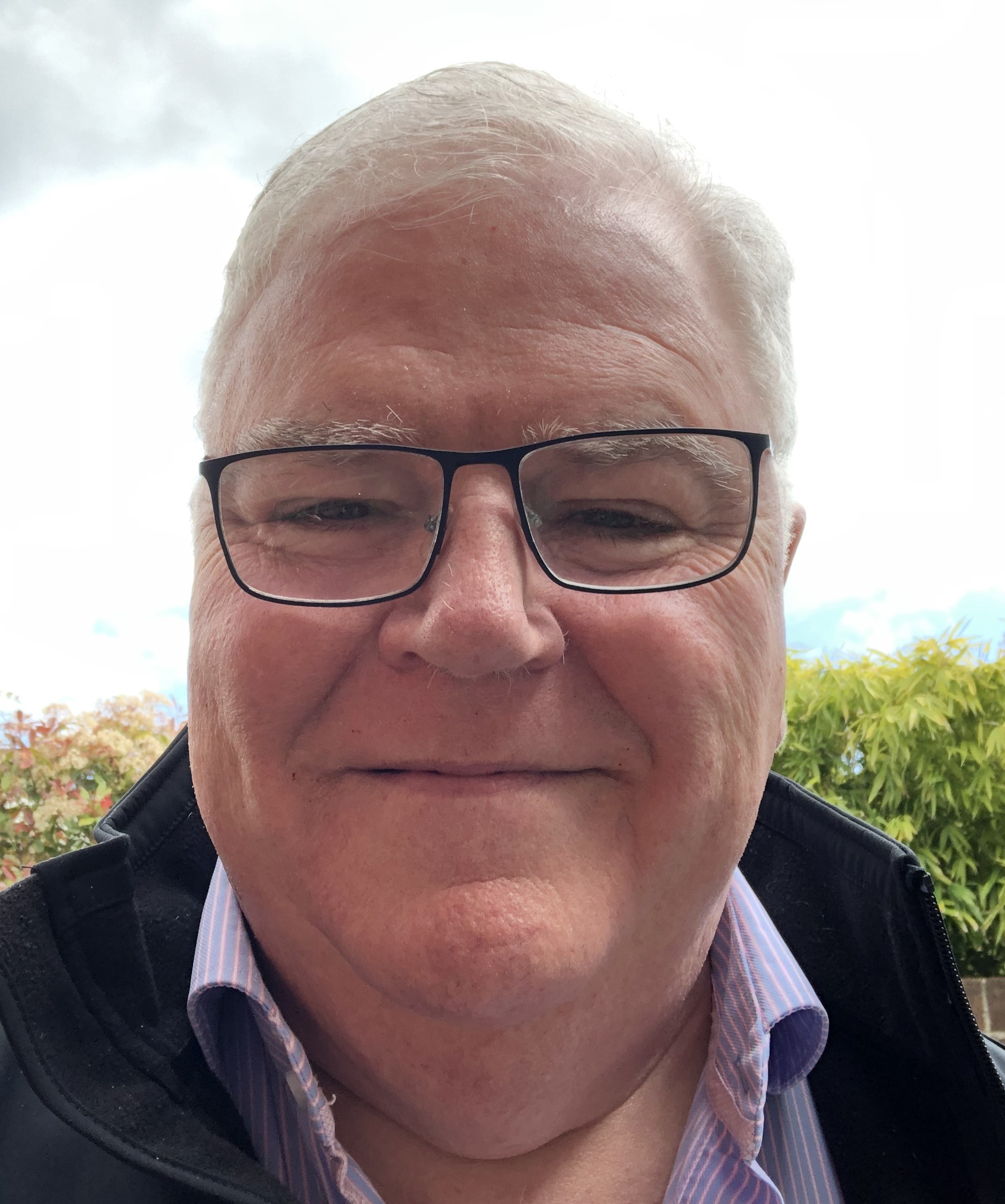 Professor Emeritus Robbie Gilligan has contributed a chapter to a major new international collection of 52 newly written chapters Routledge Handbook of Child and Family Social Work Research: Knowledge-Building, Application, and Impact . His chapter is entitled ‘Uncovering the relational complexity of kinship care – the power of qualitative research’. The chapter reviews research on issues relating to both relative care (formal care within child protection systems) and informal kinship care outside these formal systems.
Professor Emeritus Robbie Gilligan has contributed a chapter to a major new international collection of 52 newly written chapters Routledge Handbook of Child and Family Social Work Research: Knowledge-Building, Application, and Impact . His chapter is entitled ‘Uncovering the relational complexity of kinship care – the power of qualitative research’. The chapter reviews research on issues relating to both relative care (formal care within child protection systems) and informal kinship care outside these formal systems.
Oct 14, 2024
The School of Social Work & Social Policy celebrates Athena Swan Bronze Award Renewal
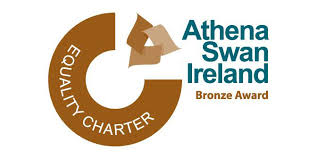
The School of Social Work & Social Policy are delighted to be awarded Bronze Renewal by Athena Swan Ireland. This achievement reflects the Schools impactful and sustained commitment to equality, diversity, and inclusion. It would not have been possible without a lot of hard work from the Athena Swan SAT comprised of:
- Mr Vitalis Bengano - PG Representative
- Dr Philip Curry - Social Policy
- Ms Rose Doolan Maher - PG Representative
- Dr Michael Feely - Social Work (Co-Chair)
- Dr Stephanie Holt - Social Work
- Ms Jennifer O'Toole - School Manager
- Ms Erin Paullin - School Administrative Staff Representative
- Dr Leigh-Ann Sweeney- Social Work (Co-Chair)
Holding an Athena Swan award is a criterion required by the Higher Education Authority, many Irish research funders and aligns with the European Commission eligibility requirements for accessing Horizon Europe research funding. SWSP is one of four Schools in the University awarded the honour. Full details can be found here
Sept 4, 2024
The ReproCit Project host a participatory seminar on "Self-determination & Reproductive Citizenship" at the Irish Museum of Modern Art on Thursday, 29 August 2024 11am-1.15pm.
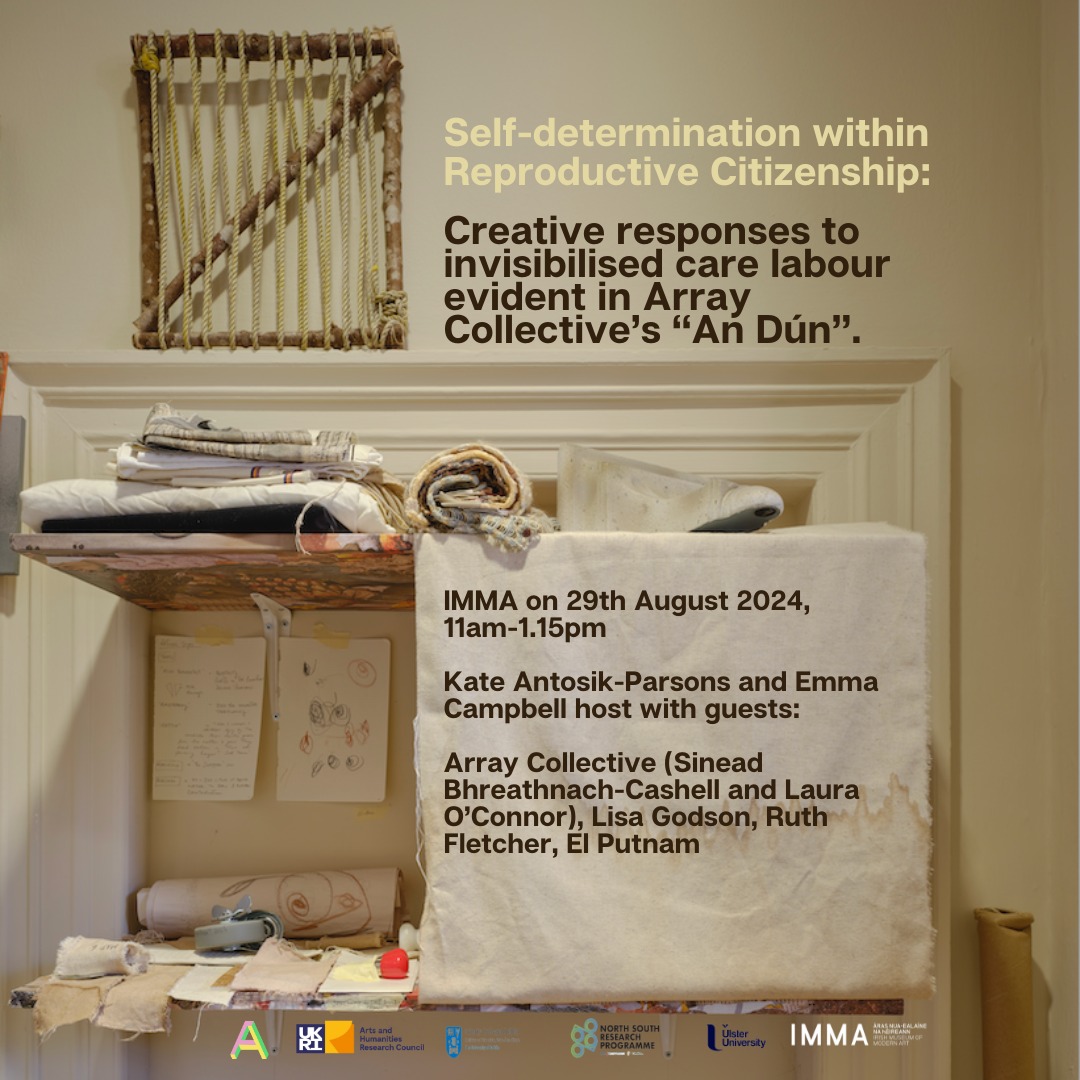
Dr Kate Antosik-Parsons (School of Social Work and Social Policy, Trinity College Dublin) and Dr Emma Campbell (School of Applied Social and Social Policy, Ulster University) of the HEA-funded North/South ReproCit Project present a public seminar on Reproductive Citizenship via provocations in response to the installation An Dún by Array Collective at the Irish Museum of Modern Art. Six artists, academics and activists will be asked to respond to the installation in advance of the seminar, where they will perform/discuss/unnerve our roles and responsibilities within a complex, evolving notion of citizenship.
After which, participating members of the public will respond in a creative workshop to the installation and provocations. The seminar hopes to develop resolutions or further questions about reproductive labour, citizenship and self-determination in a contemporary Shared Island.
Presented in Partnership with REPROCIT, a HEA-funded NSRP collaboration between researchers at Trinity College Dublin, School of Social Work and Social Policy and Ulster University, School of Applied Social and Policy Sciences.
IMMA Seminar : Self-determination & Reproductive Citizenship: https://imma.ie/whats-on/summer-at-imma-talks/
For more information on reprocit: https://reprocit.wordpress.com
Aug 26, 2024
Congratulations to Dr Catherine Conlon, Dr Kate Antosik-Parsons and Dr Éadaoin Butler on their publication "Experiences of the Irish model of community medical abortion: adherence to self-managed, people-centred abortion care".
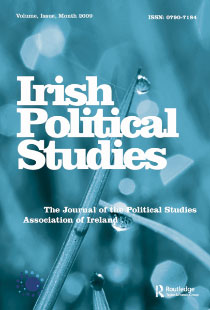 Congratulations to Dr Catherine Conlon, Dr Kate Antosik-Parsons and Dr Éadaoin Butler on their journal article in Irish Political Studies on "Experiences of the Irish model of community medical abortion: adherence to self-managed, people-centred abortion care". This article considers the operation of the Irish model of abortion care under 12 weeks gestation which has been characterised as a community medical abortion model. It draws on data gathered through 46 in-depth interviews with people accessing abortion care in Ireland under twelve weeks gestation between December 2019 and April 2021. It examines how the Irish model of community medical abortion relates to self-managed and people-centred abortion care and whether this hybrid model facilitates or circumscribes these features. The full article can be found here
Congratulations to Dr Catherine Conlon, Dr Kate Antosik-Parsons and Dr Éadaoin Butler on their journal article in Irish Political Studies on "Experiences of the Irish model of community medical abortion: adherence to self-managed, people-centred abortion care". This article considers the operation of the Irish model of abortion care under 12 weeks gestation which has been characterised as a community medical abortion model. It draws on data gathered through 46 in-depth interviews with people accessing abortion care in Ireland under twelve weeks gestation between December 2019 and April 2021. It examines how the Irish model of community medical abortion relates to self-managed and people-centred abortion care and whether this hybrid model facilitates or circumscribes these features. The full article can be found here
July 17, 2024


